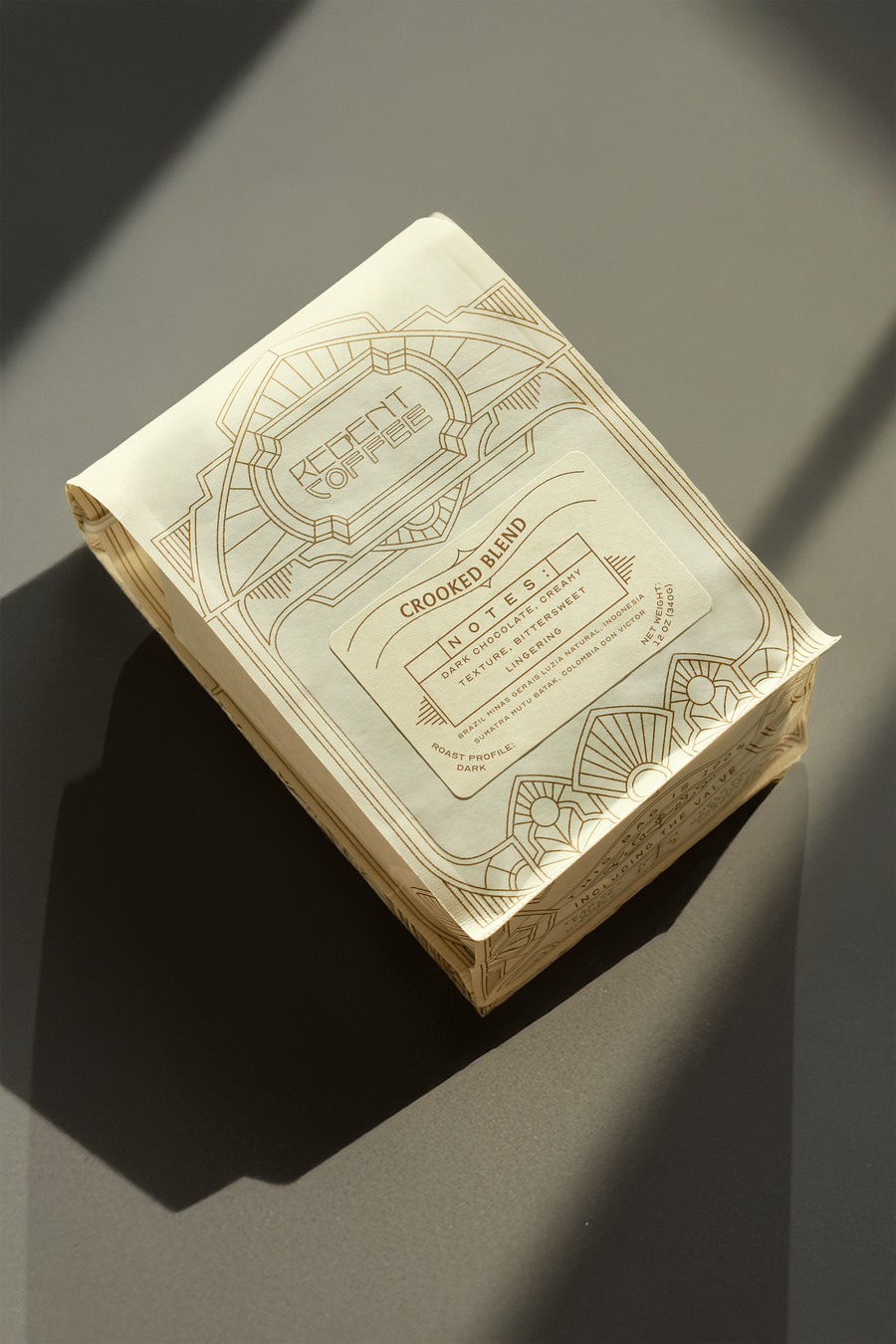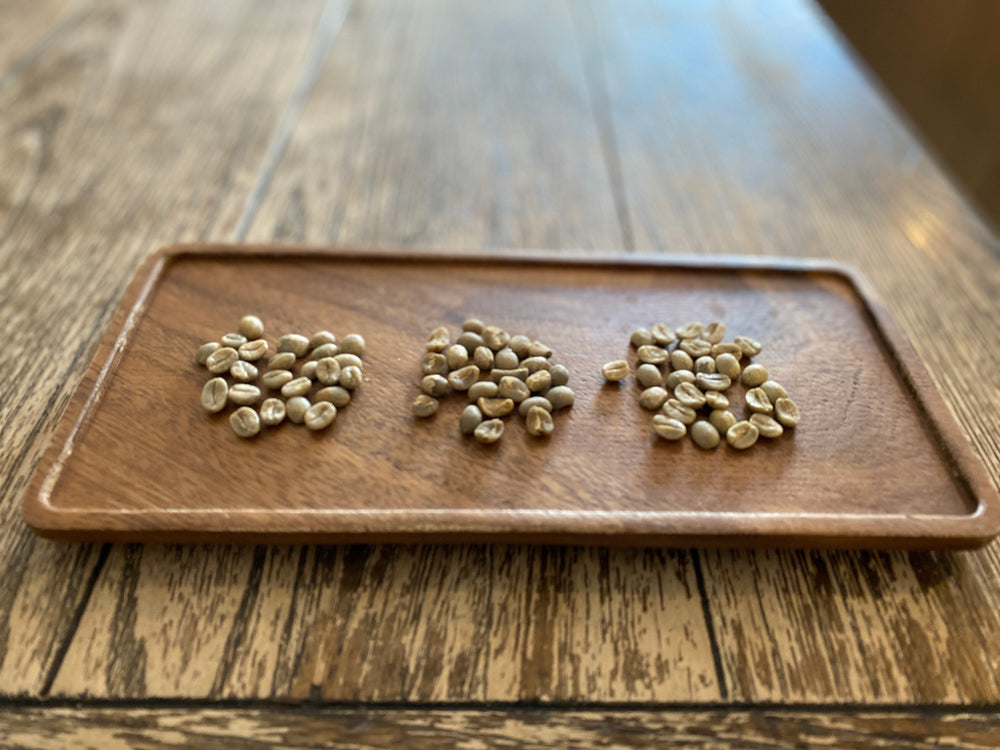What is Specialty Coffee?
"Specialty coffee" was first used in 1974 by Erna Knutsen in an issue of Tea & Coffee Trade Journal. Knutsen used this term to describe beans of the best flavor which are produced in special microclimates.
Specialty Coffee
Specialty coffee should not be confused with "gourmet" or "premium" coffee. The latter are marketing terms with no defined standards. According to the Specialty Coffee Association of America (SCAA), coffee which scores 80 points or above on a 100-point scale is graded "specialty." Specialty coffees are grown in special and ideal climates and are distinctive because of their full cup taste and little to no defects. The unique flavors and tastes are a result of the special characteristics and composition of the soils in which they are produced.
The specialty segment is the most rapidly growing portion of the coffee industry. In the U.S., specialty coffee has increased its market share from 1% to 20% in the last 25 years.
Coffee cupping, or coffee tasting, is the practice of observing the tastes and aromas of brewed coffee. It is a professional practice but can be done informally by anyone or by professionals known as "Master Tasters". A standard coffee cupping procedure involves deeply sniffing the coffee, then loudly slurping the coffee so it spreads to the back of the tongue. The coffee taster attempts to measure aspects of the coffee's taste, specifically the body (the texture or mouthfeel, such as oiliness), sweetness, acidity (a sharp and tangy feeling, like when biting into an orange), flavor (the characters in the cup), and aftertaste. Since coffee beans embody telltale flavors from the region where they were grown, cuppers may attempt to identify the coffee's origin.
Content Source: Wiki.





やもとにぜす 카지노사이트 비바카지노주소 아바타바카라 바카라사이트추천 카지노사이트 호게임 온라인도박사이트 바카라전략슈 생중계바카라 온라인카지노 샌즈카지노 텍사스카지노 슈퍼카지노 타이산게임 온라인바카라 해외온라인카지노 온라인카지노 포텐슬롯 포텐슬롯사이트 카지노쿠폰 모바일바카라 비바카지노주소 바카라 카지노주소 맥스카지노 로터스게이밍 실시간바카라 https://www.nikecom.net 다이사이게임 온라인슬롯머신게임 카심바카지노 온라인카지노 포텐슬롯 솔레어카지노 moroamee234 포텐슬롯사이트 올벳게이밍 홈카지노 로터스게이밍 포텐슬롯주소 바카라사이트 세부카지노 온라인바카라 카심바슬롯 식보게임주소 온라인카지노 퍼스트카지노 더나인카지노 바카라사이트 카지노사이트 해외온라인카지노 우리카지노 스핀슬롯 실시간바카라 https://www.nikecom.net 다이사이게임 카심바슬롯 카심바코리아 모바일바카라 더나인카지노 바카라사이트추천 https://www.nikecom.net 마이크로게임 더나인카지노먹튀 온라인바카라사이트 moroamee234 바카라사이트 카지노슬롯머신 트럼프카지노먹튀 식보게임주소 바카라마틴배팅 아바타바카라 슬롯사이트 블랙잭추천 실시간바카라 https://www.nikecom.net 다이사이게임 스피드바카라 호게임 우리카지노계열사 슬롯머신777 카심바카지노 https://www.nikecom.net 마닐라카지노 온라인카지노 SM카지노먹튀 moroamee234 포텐슬롯주소 카지노사이트 포텐슬롯 온라인바카라사이트 바카라잘하는방법 카지노사이트 슬롯머신 바카라사이트 포텐슬롯주소 포텐슬롯 카심바슬롯 카지노사이트 슬롯카지노 마닐라카지노 플러스카지노 온라인바카라 실시간바카라 https://www.nikecom.net 다이사이게임 바카라 MGM카지노 포텐슬롯주소 https://www.nikecom.net 바카라사이트 포텐슬롯사이트 바카라사이트추천 moroamee234 포텐슬롯주소 메리트카지노먹튀 카지노사이트 ちぢよをこよ
https://www.bewin777.com
https://www.dewin999.com
https://www.ktwin247.com
https://www.nikecom.net
https://www.netflixcom.net
https://www.gamja888.com/ – 온라인카지노,카지노사이트,바카라사이트,온라인바카라,카지노게임사이트,Gamja888
https://gamja888.com/ – 퀸즈슬롯
https://gamja888.com/ – 맥스카지노
https://gamja888.com/ – 비바카지노
https://gamja888.com/ – 카지노주소
https://gamja888.com/ – 바카라추천
https://gamja888.com/onlinebaccarat/ – 온라인바카라
https://gamja888.com/millionclubcasino/ – 밀리언클럽카지노
https://gamja888.com/safecasinosite/ – 안전카지노사이트
https://gamja888.com/baccaratsiterecommendation/ – 바카라사이트추천
https://gamja888.com/ourcasino/ – 우리카지노계열
https://gamja888.com/slotmachine777/ – 슬롯머신777
https://gamja888.com/royalcasinosite/ – 로얄카지노사이트
https://gamja888.com/crazyslot/ – 크레이지슬롯
https://gamja888.com/onlineblackjack/ – 온라인블랙잭
https://gamja888.com/internetroulette/ – 인터넷룰렛
https://gamja888.com/casinoverificationsite/ – 카지노검증사이트
https://gamja888.com/safebaccaratsite/ – 안전바카라사이트
https://gamja888.com/mobilebaccarat/ – 모바일바카라
https://gamja888.com/howtowin-baccarat/ – 바카라 필승법
https://gamja888.com/meritcasino/ – 메리트카지노
https://gamja888.com/baccarat-howto/ – 바카라 노하우
youube.me
instagrme.com
youubbe.me
Instagrm.me
Instagrme.net
instagrme.site
instagrme.live
naverom.me
facebokom.me
https://joinlive77.com/
klayline4@gmail.com
https://www.google.tn/url?sa=t&url=http://www.paladiny.ru/go.php?url=https://masterrumbleofcard.weebly.com/blog/10-effective-strategies-for-slot-machine-newbies
https://www.google.sn/url?sa=t&url=http://www.paladiny.ru/go.php?url=https://masterrumbleofcard.weebly.com/blog/10-effective-strategies-for-slot-machine-newbies
https://www.google.sk/url?sa=t&url=http://www.paladiny.ru/go.php?url=https://masterrumbleofcard.weebly.com/blog/10-effective-strategies-for-slot-machine-newbies
https://www.google.si/url?sa=t&url=http://www.paladiny.ru/go.php?url=https://masterrumbleofcard.weebly.com/blog/10-effective-strategies-for-slot-machine-newbies
https://www.google.sh/url?sa=t&url=http://www.paladiny.ru/go.php?url=https://masterrumbleofcard.weebly.com/blog/10-effective-strategies-for-slot-machine-newbies
https://www.google.se/url?sa=t&url=http://www.paladiny.ru/go.php?url=https://masterrumbleofcard.weebly.com/blog/10-effective-strategies-for-slot-machine-newbies
https://www.google.rw/url?sa=t&url=http://www.paladiny.ru/go.php?url=https://masterrumbleofcard.weebly.com/blog/10-effective-strategies-for-slot-machine-newbies
https://www.google.ru/url?sa=t&url=http://www.paladiny.ru/go.php?url=https://masterrumbleofcard.weebly.com/blog/10-effective-strategies-for-slot-machine-newbies
https://www.google.rs/url?sa=t&url=http://www.paladiny.ru/go.php?url=https://masterrumbleofcard.weebly.com/blog/10-effective-strategies-for-slot-machine-newbies
https://www.google.ro/url?sa=t&url=http://www.paladiny.ru/go.php?url=https://masterrumbleofcard.weebly.com/blog/10-effective-strategies-for-slot-machine-newbies
https://www.google.pt/url?sa=t&url=http://www.paladiny.ru/go.php?url=https://masterrumbleofcard.weebly.com/blog/10-effective-strategies-for-slot-machine-newbies
https://www.google.ps/url?sa=t&url=http://www.paladiny.ru/go.php?url=https://masterrumbleofcard.weebly.com/blog/10-effective-strategies-for-slot-machine-newbies
https://www.google.pl/url?sa=t&url=http://www.paladiny.ru/go.php?url=https://masterrumbleofcard.weebly.com/blog/10-effective-strategies-for-slot-machine-newbies
https://www.google.no/url?sa=t&url=http://www.paladiny.ru/go.php?url=https://masterrumbleofcard.weebly.com/blog/10-effective-strategies-for-slot-machine-newbies
https://www.google.nl/url?sa=t&url=http://www.paladiny.ru/go.php?url=https://masterrumbleofcard.weebly.com/blog/10-effective-strategies-for-slot-machine-newbies
https://www.google.mw/url?sa=t&url=http://www.paladiny.ru/go.php?url=https://masterrumbleofcard.weebly.com/blog/10-effective-strategies-for-slot-machine-newbies
https://www.google.mv/url?sa=t&url=http://www.paladiny.ru/go.php?url=https://masterrumbleofcard.weebly.com/blog/10-effective-strategies-for-slot-machine-newbies
https://www.google.mu/url?sa=t&url=http://www.paladiny.ru/go.php?url=https://masterrumbleofcard.weebly.com/blog/10-effective-strategies-for-slot-machine-newbies
https://www.google.ms/url?sa=t&url=http://www.paladiny.ru/go.php?url=https://masterrumbleofcard.weebly.com/blog/10-effective-strategies-for-slot-machine-newbies
https://www.google.mn/url?sa=t&url=http://www.paladiny.ru/go.php?url=https://masterrumbleofcard.weebly.com/blog/10-effective-strategies-for-slot-machine-newbies
https://www.google.mk/url?sa=t&url=http://www.paladiny.ru/go.php?url=https://masterrumbleofcard.weebly.com/blog/10-effective-strategies-for-slot-machine-newbies
https://www.google.mg/url?sa=t&url=http://www.paladiny.ru/go.php?url=https://masterrumbleofcard.weebly.com/blog/10-effective-strategies-for-slot-machine-newbies
https://www.google.me/url?sa=t&url=http://www.paladiny.ru/go.php?url=https://masterrumbleofcard.weebly.com/blog/10-effective-strategies-for-slot-machine-newbies
https://www.google.md/url?sa=t&url=http://www.paladiny.ru/go.php?url=https://masterrumbleofcard.weebly.com/blog/10-effective-strategies-for-slot-machine-newbies
https://www.google.lv/url?sa=t&url=http://www.paladiny.ru/go.php?url=https://masterrumbleofcard.weebly.com/blog/10-effective-strategies-for-slot-machine-newbies
https://www.google.lu/url?sa=t&url=http://www.paladiny.ru/go.php?url=https://masterrumbleofcard.weebly.com/blog/10-effective-strategies-for-slot-machine-newbies
https://www.google.lt/url?sa=t&url=http://www.paladiny.ru/go.php?url=https://masterrumbleofcard.weebly.com/blog/10-effective-strategies-for-slot-machine-newbies
https://www.google.lk/url?sa=t&url=http://www.paladiny.ru/go.php?url=https://masterrumbleofcard.weebly.com/blog/10-effective-strategies-for-slot-machine-newbies
https://www.google.li/url?sa=t&url=http://www.paladiny.ru/go.php?url=https://masterrumbleofcard.weebly.com/blog/10-effective-strategies-for-slot-machine-newbies
https://www.google.la/url?sa=t&url=http://www.paladiny.ru/go.php?url=https://masterrumbleofcard.weebly.com/blog/10-effective-strategies-for-slot-machine-newbies
https://www.google.kz/url?sa=t&url=http://www.paladiny.ru/go.php?url=https://masterrumbleofcard.weebly.com/blog/10-effective-strategies-for-slot-machine-newbies
https://www.google.kg/url?sa=t&url=http://www.paladiny.ru/go.php?url=https://masterrumbleofcard.weebly.com/blog/10-effective-strategies-for-slot-machine-newbies
https://www.google.jo/url?sa=t&url=http://www.paladiny.ru/go.php?url=https://masterrumbleofcard.weebly.com/blog/10-effective-strategies-for-slot-machine-newbies
https://www.google.je/url?sa=t&url=http://www.paladiny.ru/go.php?url=https://masterrumbleofcard.weebly.com/blog/10-effective-strategies-for-slot-machine-newbies
https://www.google.it/url?sa=t&url=http://www.paladiny.ru/go.php?url=https://masterrumbleofcard.weebly.com/blog/10-effective-strategies-for-slot-machine-newbies
https://www.google.is/url?sa=t&url=http://www.paladiny.ru/go.php?url=https://masterrumbleofcard.weebly.com/blog/10-effective-strategies-for-slot-machine-newbies
https://www.google.iq/url?sa=t&url=http://www.paladiny.ru/go.php?url=https://masterrumbleofcard.weebly.com/blog/10-effective-strategies-for-slot-machine-newbies
https://www.google.ie/url?sa=t&url=http://www.paladiny.ru/go.php?url=https://masterrumbleofcard.weebly.com/blog/10-effective-strategies-for-slot-machine-newbies
https://www.google.hu/url?sa=t&url=http://www.paladiny.ru/go.php?url=https://masterrumbleofcard.weebly.com/blog/10-effective-strategies-for-slot-machine-newbies
https://www.google.ht/url?sa=t&url=http://www.paladiny.ru/go.php?url=https://masterrumbleofcard.weebly.com/blog/10-effective-strategies-for-slot-machine-newbies
https://www.google.hr/url?sa=t&url=http://www.paladiny.ru/go.php?url=https://masterrumbleofcard.weebly.com/blog/10-effective-strategies-for-slot-machine-newbies
https://www.google.hn/url?sa=t&url=http://www.paladiny.ru/go.php?url=https://masterrumbleofcard.weebly.com/blog/10-effective-strategies-for-slot-machine-newbies
https://www.google.gr/url?sa=t&url=http://www.paladiny.ru/go.php?url=https://masterrumbleofcard.weebly.com/blog/10-effective-strategies-for-slot-machine-newbies
https://www.google.gp/url?sa=t&url=http://www.paladiny.ru/go.php?url=https://masterrumbleofcard.weebly.com/blog/10-effective-strategies-for-slot-machine-newbies
https://www.google.gm/url?sa=t&url=http://www.paladiny.ru/go.php?url=https://masterrumbleofcard.weebly.com/blog/10-effective-strategies-for-slot-machine-newbies
https://www.google.gl/url?sa=t&url=http://www.paladiny.ru/go.php?url=https://masterrumbleofcard.weebly.com/blog/10-effective-strategies-for-slot-machine-newbies
https://www.google.gg/url?sa=t&url=http://www.paladiny.ru/go.php?url=https://masterrumbleofcard.weebly.com/blog/10-effective-strategies-for-slot-machine-newbies
https://www.google.ge/url?sa=t&url=http://www.paladiny.ru/go.php?url=https://masterrumbleofcard.weebly.com/blog/10-effective-strategies-for-slot-machine-newbies
https://www.google.fr/url?sa=t&url=http://www.paladiny.ru/go.php?url=https://masterrumbleofcard.weebly.com/blog/10-effective-strategies-for-slot-machine-newbies
https://www.google.fm/url?sa=t&url=http://www.paladiny.ru/go.php?url=https://masterrumbleofcard.weebly.com/blog/10-effective-strategies-for-slot-machine-newbies
https://www.google.fi/url?sa=t&url=http://www.paladiny.ru/go.php?url=https://masterrumbleofcard.weebly.com/blog/10-effective-strategies-for-slot-machine-newbies
https://www.google.es/url?sa=t&url=http://www.paladiny.ru/go.php?url=https://masterrumbleofcard.weebly.com/blog/10-effective-strategies-for-slot-machine-newbies
https://www.google.ee/url?sa=t&url=http://www.paladiny.ru/go.php?url=https://masterrumbleofcard.weebly.com/blog/10-effective-strategies-for-slot-machine-newbies
https://www.google.dz/url?sa=t&url=http://www.paladiny.ru/go.php?url=https://masterrumbleofcard.weebly.com/blog/10-effective-strategies-for-slot-machine-newbies
https://www.google.dk/url?sa=t&url=http://www.paladiny.ru/go.php?url=https://masterrumbleofcard.weebly.com/blog/10-effective-strategies-for-slot-machine-newbies
https://www.google.dj/url?sa=t&url=http://www.paladiny.ru/go.php?url=https://masterrumbleofcard.weebly.com/blog/10-effective-strategies-for-slot-machine-newbies
https://www.google.de/url?sa=t&url=http://www.paladiny.ru/go.php?url=https://masterrumbleofcard.weebly.com/blog/10-effective-strategies-for-slot-machine-newbies
https://www.google.cz/url?sa=t&url=http://www.paladiny.ru/go.php?url=https://masterrumbleofcard.weebly.com/blog/10-effective-strategies-for-slot-machine-newbies
https://www.google.com/url?sa=t&url=http://www.paladiny.ru/go.php?url=https://masterrumbleofcard.weebly.com/blog/10-effective-strategies-for-slot-machine-newbies
https://www.google.com.vn/url?sa=t&url=http://www.paladiny.ru/go.php?url=https://masterrumbleofcard.weebly.com/blog/10-effective-strategies-for-slot-machine-newbies
https://www.google.com.uy/url?sa=t&url=http://www.paladiny.ru/go.php?url=https://masterrumbleofcard.weebly.com/blog/10-effective-strategies-for-slot-machine-newbies
https://www.google.com.ua/url?sa=t&url=http://www.paladiny.ru/go.php?url=https://masterrumbleofcard.weebly.com/blog/10-effective-strategies-for-slot-machine-newbies
https://www.google.com.tw/url?sa=t&url=http://www.paladiny.ru/go.php?url=https://masterrumbleofcard.weebly.com/blog/10-effective-strategies-for-slot-machine-newbies
https://www.google.com.tr/url?sa=t&url=http://www.paladiny.ru/go.php?url=https://masterrumbleofcard.weebly.com/blog/10-effective-strategies-for-slot-machine-newbies
https://www.google.com.sv/url?sa=t&url=http://www.paladiny.ru/go.php?url=https://masterrumbleofcard.weebly.com/blog/10-effective-strategies-for-slot-machine-newbies
https://www.google.com.sg/url?sa=t&url=http://www.paladiny.ru/go.php?url=https://masterrumbleofcard.weebly.com/blog/10-effective-strategies-for-slot-machine-newbies
https://www.google.com.sa/url?sa=t&url=http://www.paladiny.ru/go.php?url=https://masterrumbleofcard.weebly.com/blog/10-effective-strategies-for-slot-machine-newbies
https://www.google.com.qa/url?sa=t&url=http://www.paladiny.ru/go.php?url=https://masterrumbleofcard.weebly.com/blog/10-effective-strategies-for-slot-machine-newbies
https://www.google.com.py/url?sa=t&url=http://www.paladiny.ru/go.php?url=https://masterrumbleofcard.weebly.com/blog/10-effective-strategies-for-slot-machine-newbies
https://www.google.com.pr/url?sa=t&url=http://www.paladiny.ru/go.php?url=https://masterrumbleofcard.weebly.com/blog/10-effective-strategies-for-slot-machine-newbies
https://www.google.com.pk/url?sa=t&url=http://www.paladiny.ru/go.php?url=https://masterrumbleofcard.weebly.com/blog/10-effective-strategies-for-slot-machine-newbies
https://www.google.com.ph/url?sa=t&url=http://www.paladiny.ru/go.php?url=https://masterrumbleofcard.weebly.com/blog/10-effective-strategies-for-slot-machine-newbies
https://www.google.com.pe/url?sa=t&url=http://www.paladiny.ru/go.php?url=https://masterrumbleofcard.weebly.com/blog/10-effective-strategies-for-slot-machine-newbies
https://www.google.com.pa/url?sa=t&url=http://www.paladiny.ru/go.php?url=https://masterrumbleofcard.weebly.com/blog/10-effective-strategies-for-slot-machine-newbies
https://www.google.com.om/url?sa=t&url=http://www.paladiny.ru/go.php?url=https://masterrumbleofcard.weebly.com/blog/10-effective-strategies-for-slot-machine-newbies
https://www.google.com.ni/url?sa=t&url=http://www.paladiny.ru/go.php?url=https://masterrumbleofcard.weebly.com/blog/10-effective-strategies-for-slot-machine-newbies
https://www.google.com.ng/url?sa=t&url=http://www.paladiny.ru/go.php?url=https://masterrumbleofcard.weebly.com/blog/10-effective-strategies-for-slot-machine-newbies
https://www.google.com.na/url?sa=t&url=http://www.paladiny.ru/go.php?url=https://masterrumbleofcard.weebly.com/blog/10-effective-strategies-for-slot-machine-newbies
https://www.google.com.mz/url?sa=t&url=http://www.paladiny.ru/go.php?url=https://masterrumbleofcard.weebly.com/blog/10-effective-strategies-for-slot-machine-newbies
https://www.google.com.my/url?sa=t&url=http://www.paladiny.ru/go.php?url=https://masterrumbleofcard.weebly.com/blog/10-effective-strategies-for-slot-machine-newbies
https://www.google.com.mx/url?sa=t&url=http://www.paladiny.ru/go.php?url=https://masterrumbleofcard.weebly.com/blog/10-effective-strategies-for-slot-machine-newbies
https://www.google.com.mt/url?sa=t&url=http://www.paladiny.ru/go.php?url=https://masterrumbleofcard.weebly.com/blog/10-effective-strategies-for-slot-machine-newbies
https://www.google.com.ly/url?sa=t&url=http://www.paladiny.ru/go.php?url=https://masterrumbleofcard.weebly.com/blog/10-effective-strategies-for-slot-machine-newbies
https://www.google.com.lb/url?sa=t&url=http://www.paladiny.ru/go.php?url=https://masterrumbleofcard.weebly.com/blog/10-effective-strategies-for-slot-machine-newbies
https://www.google.com.kw/url?sa=t&url=http://www.paladiny.ru/go.php?url=https://masterrumbleofcard.weebly.com/blog/10-effective-strategies-for-slot-machine-newbies
https://www.google.com.kh/url?sa=t&url=http://www.paladiny.ru/go.php?url=https://masterrumbleofcard.weebly.com/blog/10-effective-strategies-for-slot-machine-newbies
https://www.google.com.jm/url?sa=t&url=http://www.paladiny.ru/go.php?url=https://masterrumbleofcard.weebly.com/blog/10-effective-strategies-for-slot-machine-newbies
https://www.google.com.hk/url?sa=t&url=http://www.paladiny.ru/go.php?url=https://masterrumbleofcard.weebly.com/blog/10-effective-strategies-for-slot-machine-newbies
https://www.google.com.gt/url?sa=t&url=http://www.paladiny.ru/go.php?url=https://masterrumbleofcard.weebly.com/blog/10-effective-strategies-for-slot-machine-newbies
https://www.google.com.gi/url?sa=t&url=http://www.paladiny.ru/go.php?url=https://masterrumbleofcard.weebly.com/blog/10-effective-strategies-for-slot-machine-newbies
https://www.google.com.gh/url?sa=t&url=http://www.paladiny.ru/go.php?url=https://masterrumbleofcard.weebly.com/blog/10-effective-strategies-for-slot-machine-newbies
https://www.google.com.fj/url?sa=t&url=http://www.paladiny.ru/go.php?url=https://masterrumbleofcard.weebly.com/blog/10-effective-strategies-for-slot-machine-newbies
https://www.google.com.et/url?sa=t&url=http://www.paladiny.ru/go.php?url=https://masterrumbleofcard.weebly.com/blog/10-effective-strategies-for-slot-machine-newbies
https://www.google.com.eg/url?sa=t&url=http://www.paladiny.ru/go.php?url=https://masterrumbleofcard.weebly.com/blog/10-effective-strategies-for-slot-machine-newbies
https://www.google.com.ec/url?sa=t&url=http://www.paladiny.ru/go.php?url=https://masterrumbleofcard.weebly.com/blog/10-effective-strategies-for-slot-machine-newbies
https://www.google.com.do/url?sa=t&url=http://www.paladiny.ru/go.php?url=https://masterrumbleofcard.weebly.com/blog/10-effective-strategies-for-slot-machine-newbies
https://www.google.com.cy/url?sa=t&url=http://www.paladiny.ru/go.php?url=https://masterrumbleofcard.weebly.com/blog/10-effective-strategies-for-slot-machine-newbies
https://www.google.com.cu/url?sa=t&url=http://www.paladiny.ru/go.php?url=https://masterrumbleofcard.weebly.com/blog/10-effective-strategies-for-slot-machine-newbies
https://www.google.com.co/url?sa=t&url=http://www.paladiny.ru/go.php?url=https://masterrumbleofcard.weebly.com/blog/10-effective-strategies-for-slot-machine-newbies
https://www.google.com.bz/url?sa=t&url=http://www.paladiny.ru/go.php?url=https://masterrumbleofcard.weebly.com/blog/10-effective-strategies-for-slot-machine-newbies
https://www.google.com.br/url?sa=t&url=http://www.paladiny.ru/go.php?url=https://masterrumbleofcard.weebly.com/blog/10-effective-strategies-for-slot-machine-newbies
https://www.google.com.bo/url?sa=t&url=http://www.paladiny.ru/go.php?url=https://masterrumbleofcard.weebly.com/blog/10-effective-strategies-for-slot-machine-newbies
https://www.google.com.bn/url?sa=t&url=http://www.paladiny.ru/go.php?url=https://masterrumbleofcard.weebly.com/blog/10-effective-strategies-for-slot-machine-newbies
https://www.google.com.bh/url?sa=t&url=http://www.paladiny.ru/go.php?url=https://masterrumbleofcard.weebly.com/blog/10-effective-strategies-for-slot-machine-newbies
https://www.google.com.bd/url?sa=t&url=http://www.paladiny.ru/go.php?url=https://masterrumbleofcard.weebly.com/blog/10-effective-strategies-for-slot-machine-newbies
https://www.google.com.au/url?sa=t&url=http://www.paladiny.ru/go.php?url=https://masterrumbleofcard.weebly.com/blog/10-effective-strategies-for-slot-machine-newbies
https://www.google.com.ar/url?sa=t&url=http://www.paladiny.ru/go.php?url=https://masterrumbleofcard.weebly.com/blog/10-effective-strategies-for-slot-machine-newbies
https://www.google.com.ag/url?sa=t&url=http://www.paladiny.ru/go.php?url=https://masterrumbleofcard.weebly.com/blog/10-effective-strategies-for-slot-machine-newbies
https://www.google.com.af/url?sa=t&url=http://www.paladiny.ru/go.php?url=https://masterrumbleofcard.weebly.com/blog/10-effective-strategies-for-slot-machine-newbies
https://www.google.co.za/url?sa=t&url=http://www.paladiny.ru/go.php?url=https://masterrumbleofcard.weebly.com/blog/10-effective-strategies-for-slot-machine-newbies
https://www.google.co.ve/url?sa=t&url=http://www.paladiny.ru/go.php?url=https://masterrumbleofcard.weebly.com/blog/10-effective-strategies-for-slot-machine-newbies
https://www.google.co.uk/url?sa=t&url=http://www.paladiny.ru/go.php?url=https://masterrumbleofcard.weebly.com/blog/10-effective-strategies-for-slot-machine-newbies
https://www.google.co.ug/url?sa=t&url=http://www.paladiny.ru/go.php?url=https://masterrumbleofcard.weebly.com/blog/10-effective-strategies-for-slot-machine-newbies
https://www.google.co.tz/url?sa=t&url=http://www.paladiny.ru/go.php?url=https://masterrumbleofcard.weebly.com/blog/10-effective-strategies-for-slot-machine-newbies
https://www.google.co.th/url?sa=t&url=http://www.paladiny.ru/go.php?url=https://masterrumbleofcard.weebly.com/blog/10-effective-strategies-for-slot-machine-newbies
https://www.google.co.nz/url?sa=t&url=http://www.paladiny.ru/go.php?url=https://masterrumbleofcard.weebly.com/blog/10-effective-strategies-for-slot-machine-newbies
https://www.google.co.ma/url?sa=t&url=http://www.paladiny.ru/go.php?url=https://masterrumbleofcard.weebly.com/blog/10-effective-strategies-for-slot-machine-newbies
https://www.google.co.ls/url?sa=t&url=http://www.paladiny.ru/go.php?url=https://masterrumbleofcard.weebly.com/blog/10-effective-strategies-for-slot-machine-newbies
https://www.google.co.kr/url?sa=t&url=http://www.paladiny.ru/go.php?url=https://masterrumbleofcard.weebly.com/blog/10-effective-strategies-for-slot-machine-newbies
https://www.google.co.ke/url?sa=t&url=http://www.paladiny.ru/go.php?url=https://masterrumbleofcard.weebly.com/blog/10-effective-strategies-for-slot-machine-newbies
https://www.google.co.jp/url?sa=t&url=http://www.paladiny.ru/go.php?url=https://masterrumbleofcard.weebly.com/blog/10-effective-strategies-for-slot-machine-newbies
https://www.google.co.in/url?sa=t&url=http://www.paladiny.ru/go.php?url=https://masterrumbleofcard.weebly.com/blog/10-effective-strategies-for-slot-machine-newbies
https://www.google.co.il/url?sa=t&url=http://www.paladiny.ru/go.php?url=https://masterrumbleofcard.weebly.com/blog/10-effective-strategies-for-slot-machine-newbies
https://www.google.co.id/url?sa=t&url=http://www.paladiny.ru/go.php?url=https://masterrumbleofcard.weebly.com/blog/10-effective-strategies-for-slot-machine-newbies
https://www.google.co.cr/url?sa=t&url=http://www.paladiny.ru/go.php?url=https://masterrumbleofcard.weebly.com/blog/10-effective-strategies-for-slot-machine-newbies
https://www.google.co.bw/url?sa=t&url=http://www.paladiny.ru/go.php?url=https://masterrumbleofcard.weebly.com/blog/10-effective-strategies-for-slot-machine-newbies
https://www.google.cm/url?sa=t&url=http://www.paladiny.ru/go.php?url=https://masterrumbleofcard.weebly.com/blog/10-effective-strategies-for-slot-machine-newbies
https://www.google.cl/url?sa=t&url=http://www.paladiny.ru/go.php?url=https://masterrumbleofcard.weebly.com/blog/10-effective-strategies-for-slot-machine-newbies
https://www.google.ci/url?sa=t&url=http://www.paladiny.ru/go.php?url=https://masterrumbleofcard.weebly.com/blog/10-effective-strategies-for-slot-machine-newbies
https://www.google.ch/url?sa=t&url=http://www.paladiny.ru/go.php?url=https://masterrumbleofcard.weebly.com/blog/10-effective-strategies-for-slot-machine-newbies
https://www.google.cd/url?sa=t&url=http://www.paladiny.ru/go.php?url=https://masterrumbleofcard.weebly.com/blog/10-effective-strategies-for-slot-machine-newbies
https://www.google.cat/url?sa=t&url=http://www.paladiny.ru/go.php?url=https://masterrumbleofcard.weebly.com/blog/10-effective-strategies-for-slot-machine-newbies
https://www.google.ca/url?sa=t&url=http://www.paladiny.ru/go.php?url=https://masterrumbleofcard.weebly.com/blog/10-effective-strategies-for-slot-machine-newbies
https://www.google.by/url?sa=t&url=http://www.paladiny.ru/go.php?url=https://masterrumbleofcard.weebly.com/blog/10-effective-strategies-for-slot-machine-newbies
https://www.google.bs/url?sa=t&url=http://www.paladiny.ru/go.php?url=https://masterrumbleofcard.weebly.com/blog/10-effective-strategies-for-slot-machine-newbies
https://www.google.bi/url?sa=t&url=http://www.paladiny.ru/go.php?url=https://masterrumbleofcard.weebly.com/blog/10-effective-strategies-for-slot-machine-newbies
https://www.google.bg/url?sa=t&url=http://www.paladiny.ru/go.php?url=https://masterrumbleofcard.weebly.com/blog/10-effective-strategies-for-slot-machine-newbies
https://www.google.bf/url?sa=t&url=http://www.paladiny.ru/go.php?url=https://masterrumbleofcard.weebly.com/blog/10-effective-strategies-for-slot-machine-newbies
https://www.google.be/url?sa=t&url=http://www.paladiny.ru/go.php?url=https://masterrumbleofcard.weebly.com/blog/10-effective-strategies-for-slot-machine-newbies
https://www.google.ba/url?sa=t&url=http://www.paladiny.ru/go.php?url=https://masterrumbleofcard.weebly.com/blog/10-effective-strategies-for-slot-machine-newbies
https://www.google.az/url?sa=t&url=http://www.paladiny.ru/go.php?url=https://masterrumbleofcard.weebly.com/blog/10-effective-strategies-for-slot-machine-newbies
https://www.google.at/url?sa=t&url=http://www.paladiny.ru/go.php?url=https://masterrumbleofcard.weebly.com/blog/10-effective-strategies-for-slot-machine-newbies
https://www.google.as/url?sa=t&url=http://www.paladiny.ru/go.php?url=https://masterrumbleofcard.weebly.com/blog/10-effective-strategies-for-slot-machine-newbies
https://www.google.am/url?sa=t&url=http://www.paladiny.ru/go.php?url=https://masterrumbleofcard.weebly.com/blog/10-effective-strategies-for-slot-machine-newbies
https://www.google.al/url?sa=t&url=http://www.paladiny.ru/go.php?url=https://masterrumbleofcard.weebly.com/blog/10-effective-strategies-for-slot-machine-newbies
https://www.google.ae/url?sa=t&url=http://www.paladiny.ru/go.php?url=https://masterrumbleofcard.weebly.com/blog/10-effective-strategies-for-slot-machine-newbies
https://www.google.ad/url?sa=t&url=http://www.paladiny.ru/go.php?url=https://masterrumbleofcard.weebly.com/blog/10-effective-strategies-for-slot-machine-newbies
https://plus.google.com/url?q=http://www.paladiny.ru/go.php?url=https://masterrumbleofcard.weebly.com/blog/10-effective-strategies-for-slot-machine-newbies
https://maps.google.tn/url?sa=t&url=http://www.paladiny.ru/go.php?url=https://masterrumbleofcard.weebly.com/blog/10-effective-strategies-for-slot-machine-newbies
https://maps.google.sn/url?sa=t&url=http://www.paladiny.ru/go.php?url=https://masterrumbleofcard.weebly.com/blog/10-effective-strategies-for-slot-machine-newbies
https://maps.google.sk/url?sa=t&url=http://www.paladiny.ru/go.php?url=https://masterrumbleofcard.weebly.com/blog/10-effective-strategies-for-slot-machine-newbies
https://maps.google.si/url?sa=t&url=http://www.paladiny.ru/go.php?url=https://masterrumbleofcard.weebly.com/blog/10-effective-strategies-for-slot-machine-newbies
https://maps.google.sh/url?sa=t&url=http://www.paladiny.ru/go.php?url=https://masterrumbleofcard.weebly.com/blog/10-effective-strategies-for-slot-machine-newbies
https://maps.google.se/url?sa=t&url=http://www.paladiny.ru/go.php?url=https://masterrumbleofcard.weebly.com/blog/10-effective-strategies-for-slot-machine-newbies
https://maps.google.rw/url?sa=t&url=http://www.paladiny.ru/go.php?url=https://masterrumbleofcard.weebly.com/blog/10-effective-strategies-for-slot-machine-newbies
https://maps.google.ru/url?sa=t&url=http://www.paladiny.ru/go.php?url=https://masterrumbleofcard.weebly.com/blog/10-effective-strategies-for-slot-machine-newbies
https://maps.google.rs/url?sa=t&url=http://www.paladiny.ru/go.php?url=https://masterrumbleofcard.weebly.com/blog/10-effective-strategies-for-slot-machine-newbies
https://maps.google.ro/url?sa=t&url=http://www.paladiny.ru/go.php?url=https://masterrumbleofcard.weebly.com/blog/10-effective-strategies-for-slot-machine-newbies
https://maps.google.pt/url?sa=t&url=http://www.paladiny.ru/go.php?url=https://masterrumbleofcard.weebly.com/blog/10-effective-strategies-for-slot-machine-newbies
https://maps.google.pl/url?sa=t&url=http://www.paladiny.ru/go.php?url=https://masterrumbleofcard.weebly.com/blog/10-effective-strategies-for-slot-machine-newbies
https://maps.google.no/url?sa=t&url=http://www.paladiny.ru/go.php?url=https://masterrumbleofcard.weebly.com/blog/10-effective-strategies-for-slot-machine-newbies
https://maps.google.nl/url?sa=t&url=http://www.paladiny.ru/go.php?url=https://masterrumbleofcard.weebly.com/blog/10-effective-strategies-for-slot-machine-newbies
https://maps.google.mw/url?sa=t&url=http://www.paladiny.ru/go.php?url=https://masterrumbleofcard.weebly.com/blog/10-effective-strategies-for-slot-machine-newbies
https://maps.google.mv/url?sa=t&url=http://www.paladiny.ru/go.php?url=https://masterrumbleofcard.weebly.com/blog/10-effective-strategies-for-slot-machine-newbies
https://maps.google.mu/url?sa=t&url=http://www.paladiny.ru/go.php?url=https://masterrumbleofcard.weebly.com/blog/10-effective-strategies-for-slot-machine-newbies
https://maps.google.ms/url?sa=t&url=http://www.paladiny.ru/go.php?url=https://masterrumbleofcard.weebly.com/blog/10-effective-strategies-for-slot-machine-newbies
https://maps.google.mn/url?sa=t&url=http://www.paladiny.ru/go.php?url=https://masterrumbleofcard.weebly.com/blog/10-effective-strategies-for-slot-machine-newbies
https://maps.google.mk/url?sa=t&url=http://www.paladiny.ru/go.php?url=https://masterrumbleofcard.weebly.com/blog/10-effective-strategies-for-slot-machine-newbies
https://maps.google.mg/url?sa=t&url=http://www.paladiny.ru/go.php?url=https://masterrumbleofcard.weebly.com/blog/10-effective-strategies-for-slot-machine-newbies
https://maps.google.lv/url?sa=t&url=http://www.paladiny.ru/go.php?url=https://masterrumbleofcard.weebly.com/blog/10-effective-strategies-for-slot-machine-newbies
https://maps.google.lu/url?sa=t&url=http://www.paladiny.ru/go.php?url=https://masterrumbleofcard.weebly.com/blog/10-effective-strategies-for-slot-machine-newbies
https://maps.google.lt/url?sa=t&url=http://www.paladiny.ru/go.php?url=https://masterrumbleofcard.weebly.com/blog/10-effective-strategies-for-slot-machine-newbies
https://maps.google.lk/url?sa=t&url=http://www.paladiny.ru/go.php?url=https://masterrumbleofcard.weebly.com/blog/10-effective-strategies-for-slot-machine-newbies
https://maps.google.li/url?sa=t&url=http://www.paladiny.ru/go.php?url=https://masterrumbleofcard.weebly.com/blog/10-effective-strategies-for-slot-machine-newbies
https://maps.google.la/url?sa=t&url=http://www.paladiny.ru/go.php?url=https://masterrumbleofcard.weebly.com/blog/10-effective-strategies-for-slot-machine-newbies
https://maps.google.kz/url?sa=t&url=http://www.paladiny.ru/go.php?url=https://masterrumbleofcard.weebly.com/blog/10-effective-strategies-for-slot-machine-newbies
https://maps.google.kg/url?sa=t&url=http://www.paladiny.ru/go.php?url=https://masterrumbleofcard.weebly.com/blog/10-effective-strategies-for-slot-machine-newbies
https://maps.google.jo/url?sa=t&url=http://www.paladiny.ru/go.php?url=https://masterrumbleofcard.weebly.com/blog/10-effective-strategies-for-slot-machine-newbies
https://maps.google.je/url?sa=t&url=http://www.paladiny.ru/go.php?url=https://masterrumbleofcard.weebly.com/blog/10-effective-strategies-for-slot-machine-newbies
https://maps.google.it/url?sa=t&url=http://www.paladiny.ru/go.php?url=https://masterrumbleofcard.weebly.com/blog/10-effective-strategies-for-slot-machine-newbies
https://maps.google.is/url?sa=t&url=http://www.paladiny.ru/go.php?url=https://masterrumbleofcard.weebly.com/blog/10-effective-strategies-for-slot-machine-newbies
https://maps.google.iq/url?sa=t&url=http://www.paladiny.ru/go.php?url=https://masterrumbleofcard.weebly.com/blog/10-effective-strategies-for-slot-machine-newbies
https://maps.google.ie/url?sa=t&url=http://www.paladiny.ru/go.php?url=https://masterrumbleofcard.weebly.com/blog/10-effective-strategies-for-slot-machine-newbies
https://maps.google.hu/url?sa=t&url=http://www.paladiny.ru/go.php?url=https://masterrumbleofcard.weebly.com/blog/10-effective-strategies-for-slot-machine-newbies
https://maps.google.ht/url?sa=t&url=http://www.paladiny.ru/go.php?url=https://masterrumbleofcard.weebly.com/blog/10-effective-strategies-for-slot-machine-newbies
https://maps.google.hr/url?sa=t&url=http://www.paladiny.ru/go.php?url=https://masterrumbleofcard.weebly.com/blog/10-effective-strategies-for-slot-machine-newbies
https://maps.google.hn/url?sa=t&url=http://www.paladiny.ru/go.php?url=https://masterrumbleofcard.weebly.com/blog/10-effective-strategies-for-slot-machine-newbies
https://maps.google.gr/url?sa=t&url=http://www.paladiny.ru/go.php?url=https://masterrumbleofcard.weebly.com/blog/10-effective-strategies-for-slot-machine-newbies
https://maps.google.gm/url?sa=t&url=http://www.paladiny.ru/go.php?url=https://masterrumbleofcard.weebly.com/blog/10-effective-strategies-for-slot-machine-newbies
https://maps.google.gl/url?sa=t&url=http://www.paladiny.ru/go.php?url=https://masterrumbleofcard.weebly.com/blog/10-effective-strategies-for-slot-machine-newbies
https://maps.google.gg/url?sa=t&url=http://www.paladiny.ru/go.php?url=https://masterrumbleofcard.weebly.com/blog/10-effective-strategies-for-slot-machine-newbies
https://maps.google.ge/url?sa=t&url=http://www.paladiny.ru/go.php?url=https://masterrumbleofcard.weebly.com/blog/10-effective-strategies-for-slot-machine-newbies
https://maps.google.fr/url?sa=t&url=http://www.paladiny.ru/go.php?url=https://masterrumbleofcard.weebly.com/blog/10-effective-strategies-for-slot-machine-newbies
https://maps.google.fm/url?sa=t&url=http://www.paladiny.ru/go.php?url=https://masterrumbleofcard.weebly.com/blog/10-effective-strategies-for-slot-machine-newbies
https://maps.google.fi/url?sa=t&url=http://www.paladiny.ru/go.php?url=https://masterrumbleofcard.weebly.com/blog/10-effective-strategies-for-slot-machine-newbies
https://maps.google.es/url?sa=t&url=http://www.paladiny.ru/go.php?url=https://masterrumbleofcard.weebly.com/blog/10-effective-strategies-for-slot-machine-newbies
https://maps.google.ee/url?sa=t&url=http://www.paladiny.ru/go.php?url=https://masterrumbleofcard.weebly.com/blog/10-effective-strategies-for-slot-machine-newbies
https://maps.google.dz/url?sa=t&url=http://www.paladiny.ru/go.php?url=https://masterrumbleofcard.weebly.com/blog/10-effective-strategies-for-slot-machine-newbies
https://maps.google.dk/url?sa=t&url=http://www.paladiny.ru/go.php?url=https://masterrumbleofcard.weebly.com/blog/10-effective-strategies-for-slot-machine-newbies
https://maps.google.dj/url?sa=t&url=http://www.paladiny.ru/go.php?url=https://masterrumbleofcard.weebly.com/blog/10-effective-strategies-for-slot-machine-newbies
https://maps.google.de/url?sa=t&url=http://www.paladiny.ru/go.php?url=https://masterrumbleofcard.weebly.com/blog/10-effective-strategies-for-slot-machine-newbies
https://maps.google.cz/url?sa=t&url=http://www.paladiny.ru/go.php?url=https://masterrumbleofcard.weebly.com/blog/10-effective-strategies-for-slot-machine-newbies
https://maps.google.com/url?sa=t&url=http://www.paladiny.ru/go.php?url=https://masterrumbleofcard.weebly.com/blog/10-effective-strategies-for-slot-machine-newbies
https://maps.google.com.uy/url?sa=t&url=http://www.paladiny.ru/go.php?url=https://masterrumbleofcard.weebly.com/blog/10-effective-strategies-for-slot-machine-newbies
https://maps.google.com.ua/url?sa=t&url=http://www.paladiny.ru/go.php?url=https://masterrumbleofcard.weebly.com/blog/10-effective-strategies-for-slot-machine-newbies
https://maps.google.com.tw/url?sa=t&url=http://www.paladiny.ru/go.php?url=https://masterrumbleofcard.weebly.com/blog/10-effective-strategies-for-slot-machine-newbies
https://maps.google.com.tr/url?sa=t&url=http://www.paladiny.ru/go.php?url=https://masterrumbleofcard.weebly.com/blog/10-effective-strategies-for-slot-machine-newbies
https://maps.google.com.sv/url?sa=t&url=http://www.paladiny.ru/go.php?url=https://masterrumbleofcard.weebly.com/blog/10-effective-strategies-for-slot-machine-newbies
https://maps.google.com.sg/url?sa=t&url=http://www.paladiny.ru/go.php?url=https://masterrumbleofcard.weebly.com/blog/10-effective-strategies-for-slot-machine-newbies
https://maps.google.com.sa/url?sa=t&url=http://www.paladiny.ru/go.php?url=https://masterrumbleofcard.weebly.com/blog/10-effective-strategies-for-slot-machine-newbies
https://maps.google.com.qa/url?sa=t&url=http://www.paladiny.ru/go.php?url=https://masterrumbleofcard.weebly.com/blog/10-effective-strategies-for-slot-machine-newbies
https://maps.google.com.py/url?sa=t&url=http://www.paladiny.ru/go.php?url=https://masterrumbleofcard.weebly.com/blog/10-effective-strategies-for-slot-machine-newbies
https://maps.google.com.pr/url?sa=t&url=http://www.paladiny.ru/go.php?url=https://masterrumbleofcard.weebly.com/blog/10-effective-strategies-for-slot-machine-newbies
https://maps.google.com.ph/url?sa=t&url=http://www.paladiny.ru/go.php?url=https://masterrumbleofcard.weebly.com/blog/10-effective-strategies-for-slot-machine-newbies
https://maps.google.com.pe/url?sa=t&url=http://www.paladiny.ru/go.php?url=https://masterrumbleofcard.weebly.com/blog/10-effective-strategies-for-slot-machine-newbies
https://maps.google.com.pa/url?sa=t&url=http://www.paladiny.ru/go.php?url=https://masterrumbleofcard.weebly.com/blog/10-effective-strategies-for-slot-machine-newbies
https://maps.google.com.om/url?sa=t&url=http://www.paladiny.ru/go.php?url=https://masterrumbleofcard.weebly.com/blog/10-effective-strategies-for-slot-machine-newbies
https://maps.google.com.ni/url?sa=t&url=http://www.paladiny.ru/go.php?url=https://masterrumbleofcard.weebly.com/blog/10-effective-strategies-for-slot-machine-newbies
https://maps.google.com.ng/url?sa=t&url=http://www.paladiny.ru/go.php?url=https://masterrumbleofcard.weebly.com/blog/10-effective-strategies-for-slot-machine-newbies
https://maps.google.com.na/url?sa=t&url=http://www.paladiny.ru/go.php?url=https://masterrumbleofcard.weebly.com/blog/10-effective-strategies-for-slot-machine-newbies
https://maps.google.com.mz/url?sa=t&url=http://www.paladiny.ru/go.php?url=https://masterrumbleofcard.weebly.com/blog/10-effective-strategies-for-slot-machine-newbies
https://maps.google.com.my/url?sa=t&url=http://www.paladiny.ru/go.php?url=https://masterrumbleofcard.weebly.com/blog/10-effective-strategies-for-slot-machine-newbies
https://maps.google.com.mx/url?sa=t&url=http://www.paladiny.ru/go.php?url=https://masterrumbleofcard.weebly.com/blog/10-effective-strategies-for-slot-machine-newbies
https://maps.google.com.mt/url?sa=t&url=http://www.paladiny.ru/go.php?url=https://masterrumbleofcard.weebly.com/blog/10-effective-strategies-for-slot-machine-newbies
https://maps.google.com.ly/url?sa=t&url=http://www.paladiny.ru/go.php?url=https://masterrumbleofcard.weebly.com/blog/10-effective-strategies-for-slot-machine-newbies
https://maps.google.com.lb/url?sa=t&url=http://www.paladiny.ru/go.php?url=https://masterrumbleofcard.weebly.com/blog/10-effective-strategies-for-slot-machine-newbies
https://maps.google.com.kw/url?sa=t&url=http://www.paladiny.ru/go.php?url=https://masterrumbleofcard.weebly.com/blog/10-effective-strategies-for-slot-machine-newbies
https://maps.google.com.kh/url?sa=t&url=http://www.paladiny.ru/go.php?url=https://masterrumbleofcard.weebly.com/blog/10-effective-strategies-for-slot-machine-newbies
https://maps.google.com.jm/url?sa=t&url=http://www.paladiny.ru/go.php?url=https://masterrumbleofcard.weebly.com/blog/10-effective-strategies-for-slot-machine-newbies
https://maps.google.com.hk/url?sa=t&url=http://www.paladiny.ru/go.php?url=https://masterrumbleofcard.weebly.com/blog/10-effective-strategies-for-slot-machine-newbies
https://maps.google.com.gt/url?sa=t&url=http://www.paladiny.ru/go.php?url=https://masterrumbleofcard.weebly.com/blog/10-effective-strategies-for-slot-machine-newbies
https://maps.google.com.gi/url?sa=t&url=http://www.paladiny.ru/go.php?url=https://masterrumbleofcard.weebly.com/blog/10-effective-strategies-for-slot-machine-newbies
https://maps.google.com.gh/url?sa=t&url=http://www.paladiny.ru/go.php?url=https://masterrumbleofcard.weebly.com/blog/10-effective-strategies-for-slot-machine-newbies
https://maps.google.com.fj/url?sa=t&url=http://www.paladiny.ru/go.php?url=https://masterrumbleofcard.weebly.com/blog/10-effective-strategies-for-slot-machine-newbies
https://maps.google.com.et/url?sa=t&url=http://www.paladiny.ru/go.php?url=https://masterrumbleofcard.weebly.com/blog/10-effective-strategies-for-slot-machine-newbies
https://maps.google.com.eg/url?sa=t&url=http://www.paladiny.ru/go.php?url=https://masterrumbleofcard.weebly.com/blog/10-effective-strategies-for-slot-machine-newbies
https://maps.google.com.ec/url?sa=t&url=http://www.paladiny.ru/go.php?url=https://masterrumbleofcard.weebly.com/blog/10-effective-strategies-for-slot-machine-newbies
https://maps.google.com.do/url?sa=t&url=http://www.paladiny.ru/go.php?url=https://masterrumbleofcard.weebly.com/blog/10-effective-strategies-for-slot-machine-newbies
https://maps.google.com.cu/url?sa=t&url=http://www.paladiny.ru/go.php?url=https://masterrumbleofcard.weebly.com/blog/10-effective-strategies-for-slot-machine-newbies
https://maps.google.com.co/url?sa=t&url=http://www.paladiny.ru/go.php?url=https://masterrumbleofcard.weebly.com/blog/10-effective-strategies-for-slot-machine-newbies
https://maps.google.com.bz/url?sa=t&url=http://www.paladiny.ru/go.php?url=https://masterrumbleofcard.weebly.com/blog/10-effective-strategies-for-slot-machine-newbies
https://maps.google.com.br/url?sa=t&url=http://www.paladiny.ru/go.php?url=https://masterrumbleofcard.weebly.com/blog/10-effective-strategies-for-slot-machine-newbies
https://maps.google.com.bo/url?sa=t&url=http://www.paladiny.ru/go.php?url=https://masterrumbleofcard.weebly.com/blog/10-effective-strategies-for-slot-machine-newbies
https://maps.google.com.bn/url?sa=t&url=http://www.paladiny.ru/go.php?url=https://masterrumbleofcard.weebly.com/blog/10-effective-strategies-for-slot-machine-newbies
https://maps.google.com.bh/url?sa=t&url=http://www.paladiny.ru/go.php?url=https://masterrumbleofcard.weebly.com/blog/10-effective-strategies-for-slot-machine-newbies
https://maps.google.com.bd/url?sa=t&url=http://www.paladiny.ru/go.php?url=https://masterrumbleofcard.weebly.com/blog/10-effective-strategies-for-slot-machine-newbies
https://maps.google.com.au/url?sa=t&url=http://www.paladiny.ru/go.php?url=https://masterrumbleofcard.weebly.com/blog/10-effective-strategies-for-slot-machine-newbies
https://maps.google.com.ar/url?sa=t&url=http://www.paladiny.ru/go.php?url=https://masterrumbleofcard.weebly.com/blog/10-effective-strategies-for-slot-machine-newbies
https://maps.google.com.ag/url?sa=t&url=http://www.paladiny.ru/go.php?url=https://masterrumbleofcard.weebly.com/blog/10-effective-strategies-for-slot-machine-newbies
https://maps.google.co.za/url?sa=t&url=http://www.paladiny.ru/go.php?url=https://masterrumbleofcard.weebly.com/blog/10-effective-strategies-for-slot-machine-newbies
https://maps.google.co.ve/url?sa=t&url=http://www.paladiny.ru/go.php?url=https://masterrumbleofcard.weebly.com/blog/10-effective-strategies-for-slot-machine-newbies
https://maps.google.co.uk/url?sa=t&url=http://www.paladiny.ru/go.php?url=https://masterrumbleofcard.weebly.com/blog/10-effective-strategies-for-slot-machine-newbies
https://maps.google.co.ug/url?sa=t&url=http://www.paladiny.ru/go.php?url=https://masterrumbleofcard.weebly.com/blog/10-effective-strategies-for-slot-machine-newbies
https://maps.google.co.tz/url?sa=t&url=http://www.paladiny.ru/go.php?url=https://masterrumbleofcard.weebly.com/blog/10-effective-strategies-for-slot-machine-newbies
https://maps.google.co.th/url?sa=t&url=http://www.paladiny.ru/go.php?url=https://masterrumbleofcard.weebly.com/blog/10-effective-strategies-for-slot-machine-newbies
https://maps.google.co.nz/url?sa=t&url=http://www.paladiny.ru/go.php?url=https://masterrumbleofcard.weebly.com/blog/10-effective-strategies-for-slot-machine-newbies
https://maps.google.co.ls/url?sa=t&url=http://www.paladiny.ru/go.php?url=https://masterrumbleofcard.weebly.com/blog/10-effective-strategies-for-slot-machine-newbies
https://maps.google.co.kr/url?sa=t&url=http://www.paladiny.ru/go.php?url=https://masterrumbleofcard.weebly.com/blog/10-effective-strategies-for-slot-machine-newbies
https://maps.google.co.ke/url?sa=t&url=http://www.paladiny.ru/go.php?url=https://masterrumbleofcard.weebly.com/blog/10-effective-strategies-for-slot-machine-newbies
https://maps.google.co.jp/url?sa=t&url=http://www.paladiny.ru/go.php?url=https://masterrumbleofcard.weebly.com/blog/10-effective-strategies-for-slot-machine-newbies
https://maps.google.co.in/url?sa=t&url=http://www.paladiny.ru/go.php?url=https://masterrumbleofcard.weebly.com/blog/10-effective-strategies-for-slot-machine-newbies
https://maps.google.co.il/url?sa=t&url=http://www.paladiny.ru/go.php?url=https://masterrumbleofcard.weebly.com/blog/10-effective-strategies-for-slot-machine-newbies
https://maps.google.co.id/url?sa=t&url=http://www.paladiny.ru/go.php?url=https://masterrumbleofcard.weebly.com/blog/10-effective-strategies-for-slot-machine-newbies
https://maps.google.co.cr/url?sa=t&url=http://www.paladiny.ru/go.php?url=https://masterrumbleofcard.weebly.com/blog/10-effective-strategies-for-slot-machine-newbies
https://maps.google.co.bw/url?sa=t&url=http://www.paladiny.ru/go.php?url=https://masterrumbleofcard.weebly.com/blog/10-effective-strategies-for-slot-machine-newbies
https://maps.google.cm/url?sa=t&url=http://www.paladiny.ru/go.php?url=https://masterrumbleofcard.weebly.com/blog/10-effective-strategies-for-slot-machine-newbies
https://maps.google.cl/url?sa=t&url=http://www.paladiny.ru/go.php?url=https://masterrumbleofcard.weebly.com/blog/10-effective-strategies-for-slot-machine-newbies
https://maps.google.ci/url?sa=t&url=http://www.paladiny.ru/go.php?url=https://masterrumbleofcard.weebly.com/blog/10-effective-strategies-for-slot-machine-newbies
https://maps.google.ch/url?sa=t&url=http://www.paladiny.ru/go.php?url=https://masterrumbleofcard.weebly.com/blog/10-effective-strategies-for-slot-machine-newbies
https://maps.google.cd/url?sa=t&url=http://www.paladiny.ru/go.php?url=https://masterrumbleofcard.weebly.com/blog/10-effective-strategies-for-slot-machine-newbies
https://maps.google.cat/url?sa=t&url=http://www.paladiny.ru/go.php?url=https://masterrumbleofcard.weebly.com/blog/10-effective-strategies-for-slot-machine-newbies
https://maps.google.ca/url?sa=t&url=http://www.paladiny.ru/go.php?url=https://masterrumbleofcard.weebly.com/blog/10-effective-strategies-for-slot-machine-newbies
https://maps.google.by/url?sa=t&url=http://www.paladiny.ru/go.php?url=https://masterrumbleofcard.weebly.com/blog/10-effective-strategies-for-slot-machine-newbies
https://maps.google.bs/url?sa=t&url=http://www.paladiny.ru/go.php?url=https://masterrumbleofcard.weebly.com/blog/10-effective-strategies-for-slot-machine-newbies
https://maps.google.bi/url?sa=t&url=http://www.paladiny.ru/go.php?url=https://masterrumbleofcard.weebly.com/blog/10-effective-strategies-for-slot-machine-newbies
https://maps.google.bg/url?sa=t&url=http://www.paladiny.ru/go.php?url=https://masterrumbleofcard.weebly.com/blog/10-effective-strategies-for-slot-machine-newbies
https://maps.google.bf/url?sa=t&url=http://www.paladiny.ru/go.php?url=https://masterrumbleofcard.weebly.com/blog/10-effective-strategies-for-slot-machine-newbies
https://maps.google.be/url?sa=t&url=http://www.paladiny.ru/go.php?url=https://masterrumbleofcard.weebly.com/blog/10-effective-strategies-for-slot-machine-newbies
https://maps.google.ba/url?sa=t&url=http://www.paladiny.ru/go.php?url=https://masterrumbleofcard.weebly.com/blog/10-effective-strategies-for-slot-machine-newbies
https://maps.google.at/url?sa=t&url=http://www.paladiny.ru/go.php?url=https://masterrumbleofcard.weebly.com/blog/10-effective-strategies-for-slot-machine-newbies
https://maps.google.as/url?sa=t&url=http://www.paladiny.ru/go.php?url=https://masterrumbleofcard.weebly.com/blog/10-effective-strategies-for-slot-machine-newbies
https://maps.google.ae/url?sa=t&url=http://www.paladiny.ru/go.php?url=https://masterrumbleofcard.weebly.com/blog/10-effective-strategies-for-slot-machine-newbies
https://maps.google.ad/url?sa=t&url=http://www.paladiny.ru/go.php?url=https://masterrumbleofcard.weebly.com/blog/10-effective-strategies-for-slot-machine-newbies
https://images.google.tn/url?sa=t&url=http://www.paladiny.ru/go.php?url=https://masterrumbleofcard.weebly.com/blog/10-effective-strategies-for-slot-machine-newbies
https://images.google.sn/url?sa=t&url=http://www.paladiny.ru/go.php?url=https://masterrumbleofcard.weebly.com/blog/10-effective-strategies-for-slot-machine-newbies
https://images.google.sk/url?sa=t&url=http://www.paladiny.ru/go.php?url=https://masterrumbleofcard.weebly.com/blog/10-effective-strategies-for-slot-machine-newbies
https://images.google.si/url?sa=t&url=http://www.paladiny.ru/go.php?url=https://masterrumbleofcard.weebly.com/blog/10-effective-strategies-for-slot-machine-newbies
https://images.google.sh/url?sa=t&url=http://www.paladiny.ru/go.php?url=https://masterrumbleofcard.weebly.com/blog/10-effective-strategies-for-slot-machine-newbies
https://images.google.se/url?sa=t&url=http://www.paladiny.ru/go.php?url=https://masterrumbleofcard.weebly.com/blog/10-effective-strategies-for-slot-machine-newbies
https://images.google.rw/url?sa=t&url=http://www.paladiny.ru/go.php?url=https://masterrumbleofcard.weebly.com/blog/10-effective-strategies-for-slot-machine-newbies
https://images.google.ru/url?sa=t&url=http://www.paladiny.ru/go.php?url=https://masterrumbleofcard.weebly.com/blog/10-effective-strategies-for-slot-machine-newbies
https://images.google.rs/url?sa=t&url=http://www.paladiny.ru/go.php?url=https://masterrumbleofcard.weebly.com/blog/10-effective-strategies-for-slot-machine-newbies
https://images.google.ro/url?sa=t&url=http://www.paladiny.ru/go.php?url=https://masterrumbleofcard.weebly.com/blog/10-effective-strategies-for-slot-machine-newbies
https://images.google.pt/url?sa=t&url=http://www.paladiny.ru/go.php?url=https://masterrumbleofcard.weebly.com/blog/10-effective-strategies-for-slot-machine-newbies
https://images.google.ps/url?sa=t&url=http://www.paladiny.ru/go.php?url=https://masterrumbleofcard.weebly.com/blog/10-effective-strategies-for-slot-machine-newbies
https://images.google.pl/url?sa=t&url=http://www.paladiny.ru/go.php?url=https://masterrumbleofcard.weebly.com/blog/10-effective-strategies-for-slot-machine-newbies
https://images.google.no/url?sa=t&url=http://www.paladiny.ru/go.php?url=https://masterrumbleofcard.weebly.com/blog/10-effective-strategies-for-slot-machine-newbies
https://images.google.nl/url?sa=t&url=http://www.paladiny.ru/go.php?url=https://masterrumbleofcard.weebly.com/blog/10-effective-strategies-for-slot-machine-newbies
https://images.google.mw/url?sa=t&url=http://www.paladiny.ru/go.php?url=https://masterrumbleofcard.weebly.com/blog/10-effective-strategies-for-slot-machine-newbies
https://images.google.mv/url?sa=t&url=http://www.paladiny.ru/go.php?url=https://masterrumbleofcard.weebly.com/blog/10-effective-strategies-for-slot-machine-newbies
https://images.google.mu/url?sa=t&url=http://www.paladiny.ru/go.php?url=https://masterrumbleofcard.weebly.com/blog/10-effective-strategies-for-slot-machine-newbies
https://images.google.ms/url?sa=t&url=http://www.paladiny.ru/go.php?url=https://masterrumbleofcard.weebly.com/blog/10-effective-strategies-for-slot-machine-newbies
https://images.google.mn/url?sa=t&url=http://www.paladiny.ru/go.php?url=https://masterrumbleofcard.weebly.com/blog/10-effective-strategies-for-slot-machine-newbies
https://images.google.mk/url?sa=t&url=http://www.paladiny.ru/go.php?url=https://masterrumbleofcard.weebly.com/blog/10-effective-strategies-for-slot-machine-newbies
https://images.google.mg/url?sa=t&url=http://www.paladiny.ru/go.php?url=https://masterrumbleofcard.weebly.com/blog/10-effective-strategies-for-slot-machine-newbies
https://images.google.me/url?sa=t&url=http://www.paladiny.ru/go.php?url=https://masterrumbleofcard.weebly.com/blog/10-effective-strategies-for-slot-machine-newbies
https://images.google.md/url?sa=t&url=http://www.paladiny.ru/go.php?url=https://masterrumbleofcard.weebly.com/blog/10-effective-strategies-for-slot-machine-newbies
https://images.google.lv/url?sa=t&url=http://www.paladiny.ru/go.php?url=https://masterrumbleofcard.weebly.com/blog/10-effective-strategies-for-slot-machine-newbies
https://images.google.lu/url?sa=t&url=http://www.paladiny.ru/go.php?url=https://masterrumbleofcard.weebly.com/blog/10-effective-strategies-for-slot-machine-newbies
https://images.google.lt/url?sa=t&url=http://www.paladiny.ru/go.php?url=https://masterrumbleofcard.weebly.com/blog/10-effective-strategies-for-slot-machine-newbies
https://images.google.lk/url?sa=t&url=http://www.paladiny.ru/go.php?url=https://masterrumbleofcard.weebly.com/blog/10-effective-strategies-for-slot-machine-newbies
https://images.google.li/url?sa=t&url=http://www.paladiny.ru/go.php?url=https://masterrumbleofcard.weebly.com/blog/10-effective-strategies-for-slot-machine-newbies
https://images.google.la/url?sa=t&url=http://www.paladiny.ru/go.php?url=https://masterrumbleofcard.weebly.com/blog/10-effective-strategies-for-slot-machine-newbies
https://images.google.kz/url?sa=t&url=http://www.paladiny.ru/go.php?url=https://masterrumbleofcard.weebly.com/blog/10-effective-strategies-for-slot-machine-newbies
https://images.google.kg/url?sa=t&url=http://www.paladiny.ru/go.php?url=https://masterrumbleofcard.weebly.com/blog/10-effective-strategies-for-slot-machine-newbies
https://images.google.jo/url?sa=t&url=http://www.paladiny.ru/go.php?url=https://masterrumbleofcard.weebly.com/blog/10-effective-strategies-for-slot-machine-newbies
https://images.google.je/url?sa=t&url=http://www.paladiny.ru/go.php?url=https://masterrumbleofcard.weebly.com/blog/10-effective-strategies-for-slot-machine-newbies
https://images.google.it/url?sa=t&url=http://www.paladiny.ru/go.php?url=https://masterrumbleofcard.weebly.com/blog/10-effective-strategies-for-slot-machine-newbies
https://images.google.is/url?sa=t&url=http://www.paladiny.ru/go.php?url=https://masterrumbleofcard.weebly.com/blog/10-effective-strategies-for-slot-machine-newbies
https://images.google.iq/url?sa=t&url=http://www.paladiny.ru/go.php?url=https://masterrumbleofcard.weebly.com/blog/10-effective-strategies-for-slot-machine-newbies
https://images.google.ie/url?sa=t&url=http://www.paladiny.ru/go.php?url=https://masterrumbleofcard.weebly.com/blog/10-effective-strategies-for-slot-machine-newbies
https://images.google.hu/url?sa=t&url=http://www.paladiny.ru/go.php?url=https://masterrumbleofcard.weebly.com/blog/10-effective-strategies-for-slot-machine-newbies
https://images.google.ht/url?sa=t&url=http://www.paladiny.ru/go.php?url=https://masterrumbleofcard.weebly.com/blog/10-effective-strategies-for-slot-machine-newbies
https://images.google.hr/url?sa=t&url=http://www.paladiny.ru/go.php?url=https://masterrumbleofcard.weebly.com/blog/10-effective-strategies-for-slot-machine-newbies
https://images.google.hn/url?sa=t&url=http://www.paladiny.ru/go.php?url=https://masterrumbleofcard.weebly.com/blog/10-effective-strategies-for-slot-machine-newbies
https://images.google.gr/url?sa=t&url=http://www.paladiny.ru/go.php?url=https://masterrumbleofcard.weebly.com/blog/10-effective-strategies-for-slot-machine-newbies
https://images.google.gp/url?sa=t&url=http://www.paladiny.ru/go.php?url=https://masterrumbleofcard.weebly.com/blog/10-effective-strategies-for-slot-machine-newbies
https://images.google.gm/url?sa=t&url=http://www.paladiny.ru/go.php?url=https://masterrumbleofcard.weebly.com/blog/10-effective-strategies-for-slot-machine-newbies
https://images.google.gl/url?sa=t&url=http://www.paladiny.ru/go.php?url=https://masterrumbleofcard.weebly.com/blog/10-effective-strategies-for-slot-machine-newbies
https://images.google.gg/url?sa=t&url=http://www.paladiny.ru/go.php?url=https://masterrumbleofcard.weebly.com/blog/10-effective-strategies-for-slot-machine-newbies
https://images.google.ge/url?sa=t&url=http://www.paladiny.ru/go.php?url=https://masterrumbleofcard.weebly.com/blog/10-effective-strategies-for-slot-machine-newbies
https://images.google.fr/url?sa=t&url=http://www.paladiny.ru/go.php?url=https://masterrumbleofcard.weebly.com/blog/10-effective-strategies-for-slot-machine-newbies
https://images.google.fm/url?sa=t&url=http://www.paladiny.ru/go.php?url=https://masterrumbleofcard.weebly.com/blog/10-effective-strategies-for-slot-machine-newbies
https://images.google.fi/url?sa=t&url=http://www.paladiny.ru/go.php?url=https://masterrumbleofcard.weebly.com/blog/10-effective-strategies-for-slot-machine-newbies
https://images.google.es/url?sa=t&url=http://www.paladiny.ru/go.php?url=https://masterrumbleofcard.weebly.com/blog/10-effective-strategies-for-slot-machine-newbies
https://images.google.ee/url?sa=t&url=http://www.paladiny.ru/go.php?url=https://masterrumbleofcard.weebly.com/blog/10-effective-strategies-for-slot-machine-newbies
https://images.google.dz/url?sa=t&url=http://www.paladiny.ru/go.php?url=https://masterrumbleofcard.weebly.com/blog/10-effective-strategies-for-slot-machine-newbies
https://images.google.dm/url?sa=t&url=http://www.paladiny.ru/go.php?url=https://masterrumbleofcard.weebly.com/blog/10-effective-strategies-for-slot-machine-newbies
https://images.google.dk/url?sa=t&url=http://www.paladiny.ru/go.php?url=https://masterrumbleofcard.weebly.com/blog/10-effective-strategies-for-slot-machine-newbies
https://images.google.dj/url?sa=t&url=http://www.paladiny.ru/go.php?url=https://masterrumbleofcard.weebly.com/blog/10-effective-strategies-for-slot-machine-newbies
https://images.google.de/url?sa=t&url=http://www.paladiny.ru/go.php?url=https://masterrumbleofcard.weebly.com/blog/10-effective-strategies-for-slot-machine-newbies
https://images.google.cz/url?sa=t&url=http://www.paladiny.ru/go.php?url=https://masterrumbleofcard.weebly.com/blog/10-effective-strategies-for-slot-machine-newbies
https://images.google.com/url?sa=t&url=http://www.paladiny.ru/go.php?url=https://masterrumbleofcard.weebly.com/blog/10-effective-strategies-for-slot-machine-newbies
https://images.google.com.vn/url?sa=t&url=http://www.paladiny.ru/go.php?url=https://masterrumbleofcard.weebly.com/blog/10-effective-strategies-for-slot-machine-newbies
https://images.google.com.vc/url?sa=t&url=http://www.paladiny.ru/go.php?url=https://masterrumbleofcard.weebly.com/blog/10-effective-strategies-for-slot-machine-newbies
https://images.google.com.uy/url?sa=t&url=http://www.paladiny.ru/go.php?url=https://masterrumbleofcard.weebly.com/blog/10-effective-strategies-for-slot-machine-newbies
https://images.google.com.ua/url?sa=t&url=http://www.paladiny.ru/go.php?url=https://masterrumbleofcard.weebly.com/blog/10-effective-strategies-for-slot-machine-newbies
https://images.google.com.tw/url?sa=t&url=http://www.paladiny.ru/go.php?url=https://masterrumbleofcard.weebly.com/blog/10-effective-strategies-for-slot-machine-newbies
https://images.google.com.tr/url?sa=t&url=http://www.paladiny.ru/go.php?url=https://masterrumbleofcard.weebly.com/blog/10-effective-strategies-for-slot-machine-newbies
https://images.google.com.sv/url?sa=t&url=http://www.paladiny.ru/go.php?url=https://masterrumbleofcard.weebly.com/blog/10-effective-strategies-for-slot-machine-newbies
https://images.google.com.sg/url?sa=t&url=http://www.paladiny.ru/go.php?url=https://masterrumbleofcard.weebly.com/blog/10-effective-strategies-for-slot-machine-newbies
https://images.google.com.sa/url?sa=t&url=http://www.paladiny.ru/go.php?url=https://masterrumbleofcard.weebly.com/blog/10-effective-strategies-for-slot-machine-newbies
https://images.google.com.qa/url?sa=t&url=http://www.paladiny.ru/go.php?url=https://masterrumbleofcard.weebly.com/blog/10-effective-strategies-for-slot-machine-newbies
https://images.google.com.py/url?sa=t&url=http://www.paladiny.ru/go.php?url=https://masterrumbleofcard.weebly.com/blog/10-effective-strategies-for-slot-machine-newbies
https://images.google.com.pr/url?sa=t&url=http://www.paladiny.ru/go.php?url=https://masterrumbleofcard.weebly.com/blog/10-effective-strategies-for-slot-machine-newbies
https://images.google.com.pk/url?sa=t&url=http://www.paladiny.ru/go.php?url=https://masterrumbleofcard.weebly.com/blog/10-effective-strategies-for-slot-machine-newbies
https://images.google.com.ph/url?sa=t&url=http://www.paladiny.ru/go.php?url=https://masterrumbleofcard.weebly.com/blog/10-effective-strategies-for-slot-machine-newbies
https://images.google.com.pe/url?sa=t&url=http://www.paladiny.ru/go.php?url=https://masterrumbleofcard.weebly.com/blog/10-effective-strategies-for-slot-machine-newbies
https://images.google.com.pa/url?sa=t&url=http://www.paladiny.ru/go.php?url=https://masterrumbleofcard.weebly.com/blog/10-effective-strategies-for-slot-machine-newbies
https://images.google.com.om/url?sa=t&url=http://www.paladiny.ru/go.php?url=https://masterrumbleofcard.weebly.com/blog/10-effective-strategies-for-slot-machine-newbies
https://images.google.com.np/url?sa=t&url=http://www.paladiny.ru/go.php?url=https://masterrumbleofcard.weebly.com/blog/10-effective-strategies-for-slot-machine-newbies
https://images.google.com.ni/url?sa=t&url=http://www.paladiny.ru/go.php?url=https://masterrumbleofcard.weebly.com/blog/10-effective-strategies-for-slot-machine-newbies
https://images.google.com.ng/url?sa=t&url=http://www.paladiny.ru/go.php?url=https://masterrumbleofcard.weebly.com/blog/10-effective-strategies-for-slot-machine-newbies
https://images.google.com.na/url?sa=t&url=http://www.paladiny.ru/go.php?url=https://masterrumbleofcard.weebly.com/blog/10-effective-strategies-for-slot-machine-newbies
https://images.google.com.mz/url?sa=t&url=http://www.paladiny.ru/go.php?url=https://masterrumbleofcard.weebly.com/blog/10-effective-strategies-for-slot-machine-newbies
https://images.google.com.my/url?sa=t&url=http://www.paladiny.ru/go.php?url=https://masterrumbleofcard.weebly.com/blog/10-effective-strategies-for-slot-machine-newbies
https://images.google.com.mx/url?sa=t&url=http://www.paladiny.ru/go.php?url=https://masterrumbleofcard.weebly.com/blog/10-effective-strategies-for-slot-machine-newbies
https://images.google.com.mt/url?sa=t&url=http://www.paladiny.ru/go.php?url=https://masterrumbleofcard.weebly.com/blog/10-effective-strategies-for-slot-machine-newbies
https://images.google.com.ly/url?sa=t&url=http://www.paladiny.ru/go.php?url=https://masterrumbleofcard.weebly.com/blog/10-effective-strategies-for-slot-machine-newbies
https://images.google.com.lb/url?sa=t&url=http://www.paladiny.ru/go.php?url=https://masterrumbleofcard.weebly.com/blog/10-effective-strategies-for-slot-machine-newbies
https://images.google.com.kw/url?sa=t&url=http://www.paladiny.ru/go.php?url=https://masterrumbleofcard.weebly.com/blog/10-effective-strategies-for-slot-machine-newbies
https://images.google.com.kh/url?sa=t&url=http://www.paladiny.ru/go.php?url=https://masterrumbleofcard.weebly.com/blog/10-effective-strategies-for-slot-machine-newbies
https://images.google.com.jm/url?sa=t&url=http://www.paladiny.ru/go.php?url=https://masterrumbleofcard.weebly.com/blog/10-effective-strategies-for-slot-machine-newbies
https://images.google.com.hk/url?sa=t&url=http://www.paladiny.ru/go.php?url=https://masterrumbleofcard.weebly.com/blog/10-effective-strategies-for-slot-machine-newbies
https://images.google.com.gt/url?sa=t&url=http://www.paladiny.ru/go.php?url=https://masterrumbleofcard.weebly.com/blog/10-effective-strategies-for-slot-machine-newbies
https://images.google.com.gi/url?sa=t&url=http://www.paladiny.ru/go.php?url=https://masterrumbleofcard.weebly.com/blog/10-effective-strategies-for-slot-machine-newbies
https://images.google.com.gh/url?sa=t&url=http://www.paladiny.ru/go.php?url=https://masterrumbleofcard.weebly.com/blog/10-effective-strategies-for-slot-machine-newbies
https://images.google.com.fj/url?sa=t&url=http://www.paladiny.ru/go.php?url=https://masterrumbleofcard.weebly.com/blog/10-effective-strategies-for-slot-machine-newbies
https://images.google.com.et/url?sa=t&url=http://www.paladiny.ru/go.php?url=https://masterrumbleofcard.weebly.com/blog/10-effective-strategies-for-slot-machine-newbies
https://images.google.com.eg/url?sa=t&url=http://www.paladiny.ru/go.php?url=https://masterrumbleofcard.weebly.com/blog/10-effective-strategies-for-slot-machine-newbies
https://images.google.com.ec/url?sa=t&url=http://www.paladiny.ru/go.php?url=https://masterrumbleofcard.weebly.com/blog/10-effective-strategies-for-slot-machine-newbies
https://images.google.com.do/url?sa=t&url=http://www.paladiny.ru/go.php?url=https://masterrumbleofcard.weebly.com/blog/10-effective-strategies-for-slot-machine-newbies
https://images.google.com.cy/url?sa=t&url=http://www.paladiny.ru/go.php?url=https://masterrumbleofcard.weebly.com/blog/10-effective-strategies-for-slot-machine-newbies
https://images.google.com.cu/url?sa=t&url=http://www.paladiny.ru/go.php?url=https://masterrumbleofcard.weebly.com/blog/10-effective-strategies-for-slot-machine-newbies
https://images.google.com.co/url?sa=t&url=http://www.paladiny.ru/go.php?url=https://masterrumbleofcard.weebly.com/blog/10-effective-strategies-for-slot-machine-newbies
https://images.google.com.bz/url?sa=t&url=http://www.paladiny.ru/go.php?url=https://masterrumbleofcard.weebly.com/blog/10-effective-strategies-for-slot-machine-newbies
https://images.google.com.br/url?sa=t&url=http://www.paladiny.ru/go.php?url=https://masterrumbleofcard.weebly.com/blog/10-effective-strategies-for-slot-machine-newbies
https://images.google.com.bo/url?sa=t&url=http://www.paladiny.ru/go.php?url=https://masterrumbleofcard.weebly.com/blog/10-effective-strategies-for-slot-machine-newbies
https://images.google.com.bn/url?sa=t&url=http://www.paladiny.ru/go.php?url=https://masterrumbleofcard.weebly.com/blog/10-effective-strategies-for-slot-machine-newbies
https://images.google.com.bh/url?sa=t&url=http://www.paladiny.ru/go.php?url=https://masterrumbleofcard.weebly.com/blog/10-effective-strategies-for-slot-machine-newbies
https://images.google.com.bd/url?sa=t&url=http://www.paladiny.ru/go.php?url=https://masterrumbleofcard.weebly.com/blog/10-effective-strategies-for-slot-machine-newbies
https://images.google.com.au/url?sa=t&url=http://www.paladiny.ru/go.php?url=https://masterrumbleofcard.weebly.com/blog/10-effective-strategies-for-slot-machine-newbies
https://images.google.com.ar/url?sa=t&url=http://www.paladiny.ru/go.php?url=https://masterrumbleofcard.weebly.com/blog/10-effective-strategies-for-slot-machine-newbies
https://images.google.com.ag/url?sa=t&url=http://www.paladiny.ru/go.php?url=https://masterrumbleofcard.weebly.com/blog/10-effective-strategies-for-slot-machine-newbies
https://images.google.com.af/url?sa=t&url=http://www.paladiny.ru/go.php?url=https://masterrumbleofcard.weebly.com/blog/10-effective-strategies-for-slot-machine-newbies
https://images.google.co.zm/url?sa=t&url=http://www.paladiny.ru/go.php?url=https://masterrumbleofcard.weebly.com/blog/10-effective-strategies-for-slot-machine-newbies
https://images.google.co.za/url?sa=t&url=http://www.paladiny.ru/go.php?url=https://masterrumbleofcard.weebly.com/blog/10-effective-strategies-for-slot-machine-newbies
https://images.google.co.za/url?q=http://www.paladiny.ru/go.php?url=https://masterrumbleofcard.weebly.com/blog/10-effective-strategies-for-slot-machine-newbies
https://images.google.co.ve/url?sa=t&url=http://www.paladiny.ru/go.php?url=https://masterrumbleofcard.weebly.com/blog/10-effective-strategies-for-slot-machine-newbies
https://images.google.co.uz/url?sa=t&url=http://www.paladiny.ru/go.php?url=https://masterrumbleofcard.weebly.com/blog/10-effective-strategies-for-slot-machine-newbies
https://images.google.co.uk/url?sa=t&url=http://www.paladiny.ru/go.php?url=https://masterrumbleofcard.weebly.com/blog/10-effective-strategies-for-slot-machine-newbies
https://images.google.co.ug/url?sa=t&url=http://www.paladiny.ru/go.php?url=https://masterrumbleofcard.weebly.com/blog/10-effective-strategies-for-slot-machine-newbies
https://images.google.co.tz/url?sa=t&url=http://www.paladiny.ru/go.php?url=https://masterrumbleofcard.weebly.com/blog/10-effective-strategies-for-slot-machine-newbies
https://images.google.co.th/url?sa=t&url=http://www.paladiny.ru/go.php?url=https://masterrumbleofcard.weebly.com/blog/10-effective-strategies-for-slot-machine-newbies
https://images.google.co.th/url?q=http://www.paladiny.ru/go.php?url=https://masterrumbleofcard.weebly.com/blog/10-effective-strategies-for-slot-machine-newbies
https://images.google.co.nz/url?sa=t&url=http://www.paladiny.ru/go.php?url=https://masterrumbleofcard.weebly.com/blog/10-effective-strategies-for-slot-machine-newbies
https://images.google.co.ma/url?sa=t&url=http://www.paladiny.ru/go.php?url=https://masterrumbleofcard.weebly.com/blog/10-effective-strategies-for-slot-machine-newbies
https://images.google.co.ls/url?sa=t&url=http://www.paladiny.ru/go.php?url=https://masterrumbleofcard.weebly.com/blog/10-effective-strategies-for-slot-machine-newbies
https://images.google.co.kr/url?sa=t&url=http://www.paladiny.ru/go.php?url=https://masterrumbleofcard.weebly.com/blog/10-effective-strategies-for-slot-machine-newbies
https://images.google.co.kr/url?q=http://www.paladiny.ru/go.php?url=https://masterrumbleofcard.weebly.com/blog/10-effective-strategies-for-slot-machine-newbies
https://images.google.co.ke/url?sa=t&url=http://www.paladiny.ru/go.php?url=https://masterrumbleofcard.weebly.com/blog/10-effective-strategies-for-slot-machine-newbies
https://images.google.co.jp/url?sa=t&url=http://www.paladiny.ru/go.php?url=https://masterrumbleofcard.weebly.com/blog/10-effective-strategies-for-slot-machine-newbies
https://images.google.co.in/url?sa=t&url=http://www.paladiny.ru/go.php?url=https://masterrumbleofcard.weebly.com/blog/10-effective-strategies-for-slot-machine-newbies
https://images.google.co.il/url?sa=t&url=http://www.paladiny.ru/go.php?url=https://masterrumbleofcard.weebly.com/blog/10-effective-strategies-for-slot-machine-newbies
https://images.google.co.id/url?sa=t&url=http://www.paladiny.ru/go.php?url=https://masterrumbleofcard.weebly.com/blog/10-effective-strategies-for-slot-machine-newbies
https://images.google.co.id/url?q=http://www.paladiny.ru/go.php?url=https://masterrumbleofcard.weebly.com/blog/10-effective-strategies-for-slot-machine-newbies
https://images.google.co.cr/url?sa=t&url=http://www.paladiny.ru/go.php?url=https://masterrumbleofcard.weebly.com/blog/10-effective-strategies-for-slot-machine-newbies
https://images.google.co.cr/url?q=http://www.paladiny.ru/go.php?url=https://masterrumbleofcard.weebly.com/blog/10-effective-strategies-for-slot-machine-newbies
https://images.google.co.ck/url?sa=t&url=http://www.paladiny.ru/go.php?url=https://masterrumbleofcard.weebly.com/blog/10-effective-strategies-for-slot-machine-newbies
https://images.google.co.bw/url?sa=t&url=http://www.paladiny.ru/go.php?url=https://masterrumbleofcard.weebly.com/blog/10-effective-strategies-for-slot-machine-newbies
https://images.google.cm/url?sa=t&url=http://www.paladiny.ru/go.php?url=https://masterrumbleofcard.weebly.com/blog/10-effective-strategies-for-slot-machine-newbies
https://images.google.cl/url?sa=t&url=http://www.paladiny.ru/go.php?url=https://masterrumbleofcard.weebly.com/blog/10-effective-strategies-for-slot-machine-newbies
https://images.google.ci/url?sa=t&url=http://www.paladiny.ru/go.php?url=https://masterrumbleofcard.weebly.com/blog/10-effective-strategies-for-slot-machine-newbies
https://images.google.ch/url?sa=t&url=http://www.paladiny.ru/go.php?url=https://masterrumbleofcard.weebly.com/blog/10-effective-strategies-for-slot-machine-newbies
https://images.google.cg/url?sa=t&url=http://www.paladiny.ru/go.php?url=https://masterrumbleofcard.weebly.com/blog/10-effective-strategies-for-slot-machine-newbies
https://images.google.cd/url?sa=t&url=http://www.paladiny.ru/go.php?url=https://masterrumbleofcard.weebly.com/blog/10-effective-strategies-for-slot-machine-newbies
https://images.google.cat/url?sa=t&url=http://www.paladiny.ru/go.php?url=https://masterrumbleofcard.weebly.com/blog/10-effective-strategies-for-slot-machine-newbies
https://images.google.ca/url?sa=t&url=http://www.paladiny.ru/go.php?url=https://masterrumbleofcard.weebly.com/blog/10-effective-strategies-for-slot-machine-newbies
https://images.google.by/url?sa=t&url=http://www.paladiny.ru/go.php?url=https://masterrumbleofcard.weebly.com/blog/10-effective-strategies-for-slot-machine-newbies
https://images.google.bs/url?sa=t&url=http://www.paladiny.ru/go.php?url=https://masterrumbleofcard.weebly.com/blog/10-effective-strategies-for-slot-machine-newbies
https://images.google.bi/url?sa=t&url=http://www.paladiny.ru/go.php?url=https://masterrumbleofcard.weebly.com/blog/10-effective-strategies-for-slot-machine-newbies
https://images.google.bg/url?sa=t&url=http://www.paladiny.ru/go.php?url=https://masterrumbleofcard.weebly.com/blog/10-effective-strategies-for-slot-machine-newbies
https://images.google.bf/url?sa=t&url=http://www.paladiny.ru/go.php?url=https://masterrumbleofcard.weebly.com/blog/10-effective-strategies-for-slot-machine-newbies
https://images.google.be/url?sa=t&url=http://www.paladiny.ru/go.php?url=https://masterrumbleofcard.weebly.com/blog/10-effective-strategies-for-slot-machine-newbies
https://images.google.ba/url?sa=t&url=http://www.paladiny.ru/go.php?url=https://masterrumbleofcard.weebly.com/blog/10-effective-strategies-for-slot-machine-newbies
https://images.google.ba/url?q=http://www.paladiny.ru/go.php?url=https://masterrumbleofcard.weebly.com/blog/10-effective-strategies-for-slot-machine-newbies
https://images.google.az/url?sa=t&url=http://www.paladiny.ru/go.php?url=https://masterrumbleofcard.weebly.com/blog/10-effective-strategies-for-slot-machine-newbies
https://images.google.at/url?sa=t&url=http://www.paladiny.ru/go.php?url=https://masterrumbleofcard.weebly.com/blog/10-effective-strategies-for-slot-machine-newbies
https://images.google.as/url?sa=t&url=http://www.paladiny.ru/go.php?url=https://masterrumbleofcard.weebly.com/blog/10-effective-strategies-for-slot-machine-newbies
https://images.google.am/url?sa=t&url=http://www.paladiny.ru/go.php?url=https://masterrumbleofcard.weebly.com/blog/10-effective-strategies-for-slot-machine-newbies
https://images.google.al/url?sa=t&url=http://www.paladiny.ru/go.php?url=https://masterrumbleofcard.weebly.com/blog/10-effective-strategies-for-slot-machine-newbies
https://images.google.ae/url?sa=t&url=http://www.paladiny.ru/go.php?url=https://masterrumbleofcard.weebly.com/blog/10-effective-strategies-for-slot-machine-newbies
https://images.google.ae/url?q=http://www.paladiny.ru/go.php?url=https://masterrumbleofcard.weebly.com/blog/10-effective-strategies-for-slot-machine-newbies
https://images.google.ad/url?sa=t&url=http://www.paladiny.ru/go.php?url=https://masterrumbleofcard.weebly.com/blog/10-effective-strategies-for-slot-machine-newbies
https://cse.google.vg/url?sa=t&url=http://www.paladiny.ru/go.php?url=https://masterrumbleofcard.weebly.com/blog/10-effective-strategies-for-slot-machine-newbies
https://cse.google.to/url?sa=t&url=http://www.paladiny.ru/go.php?url=https://masterrumbleofcard.weebly.com/blog/10-effective-strategies-for-slot-machine-newbies
https://cse.google.tn/url?sa=t&url=http://www.paladiny.ru/go.php?url=https://masterrumbleofcard.weebly.com/blog/10-effective-strategies-for-slot-machine-newbies
https://cse.google.tm/url?sa=t&url=http://www.paladiny.ru/go.php?url=https://masterrumbleofcard.weebly.com/blog/10-effective-strategies-for-slot-machine-newbies
https://cse.google.sn/url?sa=t&url=http://www.paladiny.ru/go.php?url=https://masterrumbleofcard.weebly.com/blog/10-effective-strategies-for-slot-machine-newbies
https://cse.google.sm/url?sa=t&url=http://www.paladiny.ru/go.php?url=https://masterrumbleofcard.weebly.com/blog/10-effective-strategies-for-slot-machine-newbies
https://cse.google.sk/url?sa=t&url=http://www.paladiny.ru/go.php?url=https://masterrumbleofcard.weebly.com/blog/10-effective-strategies-for-slot-machine-newbies
https://cse.google.si/url?sa=t&url=http://www.paladiny.ru/go.php?url=https://masterrumbleofcard.weebly.com/blog/10-effective-strategies-for-slot-machine-newbies
https://cse.google.sh/url?sa=t&url=http://www.paladiny.ru/go.php?url=https://masterrumbleofcard.weebly.com/blog/10-effective-strategies-for-slot-machine-newbies
https://cse.google.se/url?sa=t&url=http://www.paladiny.ru/go.php?url=https://masterrumbleofcard.weebly.com/blog/10-effective-strategies-for-slot-machine-newbies
https://cse.google.sc/url?sa=t&url=http://www.paladiny.ru/go.php?url=https://masterrumbleofcard.weebly.com/blog/10-effective-strategies-for-slot-machine-newbies
https://cse.google.rw/url?sa=t&url=http://www.paladiny.ru/go.php?url=https://masterrumbleofcard.weebly.com/blog/10-effective-strategies-for-slot-machine-newbies
https://cse.google.rs/url?sa=t&url=http://www.paladiny.ru/go.php?url=https://masterrumbleofcard.weebly.com/blog/10-effective-strategies-for-slot-machine-newbies
https://cse.google.ro/url?sa=t&url=http://www.paladiny.ru/go.php?url=https://masterrumbleofcard.weebly.com/blog/10-effective-strategies-for-slot-machine-newbies
https://cse.google.pt/url?sa=t&url=http://www.paladiny.ru/go.php?url=https://masterrumbleofcard.weebly.com/blog/10-effective-strategies-for-slot-machine-newbies
https://cse.google.ps/url?sa=t&url=http://www.paladiny.ru/go.php?url=https://masterrumbleofcard.weebly.com/blog/10-effective-strategies-for-slot-machine-newbies
https://cse.google.no/url?sa=t&url=http://www.paladiny.ru/go.php?url=https://masterrumbleofcard.weebly.com/blog/10-effective-strategies-for-slot-machine-newbies
https://cse.google.mw/url?sa=t&url=http://www.paladiny.ru/go.php?url=https://masterrumbleofcard.weebly.com/blog/10-effective-strategies-for-slot-machine-newbies
https://cse.google.ms/url?sa=t&url=http://www.paladiny.ru/go.php?url=https://masterrumbleofcard.weebly.com/blog/10-effective-strategies-for-slot-machine-newbies
https://cse.google.mn/url?sa=t&url=http://www.paladiny.ru/go.php?url=https://masterrumbleofcard.weebly.com/blog/10-effective-strategies-for-slot-machine-newbies
https://cse.google.md/url?sa=t&url=http://www.paladiny.ru/go.php?url=https://masterrumbleofcard.weebly.com/blog/10-effective-strategies-for-slot-machine-newbies
https://cse.google.lv/url?sa=t&url=http://www.paladiny.ru/go.php?url=https://masterrumbleofcard.weebly.com/blog/10-effective-strategies-for-slot-machine-newbies
https://cse.google.lu/url?sa=t&url=http://www.paladiny.ru/go.php?url=https://masterrumbleofcard.weebly.com/blog/10-effective-strategies-for-slot-machine-newbies
https://cse.google.lt/url?sa=t&url=http://www.paladiny.ru/go.php?url=https://masterrumbleofcard.weebly.com/blog/10-effective-strategies-for-slot-machine-newbies
https://cse.google.lk/url?sa=t&url=http://www.paladiny.ru/go.php?url=https://masterrumbleofcard.weebly.com/blog/10-effective-strategies-for-slot-machine-newbies
https://cse.google.kz/url?sa=t&url=http://www.paladiny.ru/go.php?url=https://masterrumbleofcard.weebly.com/blog/10-effective-strategies-for-slot-machine-newbies
https://cse.google.kg/url?sa=t&url=http://www.paladiny.ru/go.php?url=https://masterrumbleofcard.weebly.com/blog/10-effective-strategies-for-slot-machine-newbies
https://cse.google.jo/url?sa=t&url=http://www.paladiny.ru/go.php?url=https://masterrumbleofcard.weebly.com/blog/10-effective-strategies-for-slot-machine-newbies
https://cse.google.is/url?sa=t&url=http://www.paladiny.ru/go.php?url=https://masterrumbleofcard.weebly.com/blog/10-effective-strategies-for-slot-machine-newbies
https://cse.google.ie/url?sa=t&url=http://www.paladiny.ru/go.php?url=https://masterrumbleofcard.weebly.com/blog/10-effective-strategies-for-slot-machine-newbies
https://cse.google.hu/url?sa=t&url=http://www.paladiny.ru/go.php?url=https://masterrumbleofcard.weebly.com/blog/10-effective-strategies-for-slot-machine-newbies
https://cse.google.ht/url?sa=t&url=http://www.paladiny.ru/go.php?url=https://masterrumbleofcard.weebly.com/blog/10-effective-strategies-for-slot-machine-newbies
https://cse.google.hr/url?sa=t&url=http://www.paladiny.ru/go.php?url=https://masterrumbleofcard.weebly.com/blog/10-effective-strategies-for-slot-machine-newbies
https://cse.google.gr/url?sa=t&url=http://www.paladiny.ru/go.php?url=https://masterrumbleofcard.weebly.com/blog/10-effective-strategies-for-slot-machine-newbies
https://cse.google.gm/url?sa=t&url=http://www.paladiny.ru/go.php?url=https://masterrumbleofcard.weebly.com/blog/10-effective-strategies-for-slot-machine-newbies
https://cse.google.gl/url?sa=t&url=http://www.paladiny.ru/go.php?url=https://masterrumbleofcard.weebly.com/blog/10-effective-strategies-for-slot-machine-newbies
https://cse.google.gg/url?sa=t&url=http://www.paladiny.ru/go.php?url=https://masterrumbleofcard.weebly.com/blog/10-effective-strategies-for-slot-machine-newbies
https://cse.google.ge/url?sa=t&url=http://www.paladiny.ru/go.php?url=https://masterrumbleofcard.weebly.com/blog/10-effective-strategies-for-slot-machine-newbies
https://cse.google.fm/url?sa=t&url=http://www.paladiny.ru/go.php?url=https://masterrumbleofcard.weebly.com/blog/10-effective-strategies-for-slot-machine-newbies
https://cse.google.fi/url?sa=t&url=http://www.paladiny.ru/go.php?url=https://masterrumbleofcard.weebly.com/blog/10-effective-strategies-for-slot-machine-newbies
https://cse.google.es/url?sa=t&url=http://www.paladiny.ru/go.php?url=https://masterrumbleofcard.weebly.com/blog/10-effective-strategies-for-slot-machine-newbies
https://cse.google.es/url?sa=i&url=http://www.paladiny.ru/go.php?url=https://masterrumbleofcard.weebly.com/blog/10-effective-strategies-for-slot-machine-newbies
https://cse.google.ee/url?sa=t&url=http://www.paladiny.ru/go.php?url=https://masterrumbleofcard.weebly.com/blog/10-effective-strategies-for-slot-machine-newbies
https://cse.google.dm/url?sa=t&url=http://www.paladiny.ru/go.php?url=https://masterrumbleofcard.weebly.com/blog/10-effective-strategies-for-slot-machine-newbies
https://cse.google.dk/url?sa=t&url=http://www.paladiny.ru/go.php?url=https://masterrumbleofcard.weebly.com/blog/10-effective-strategies-for-slot-machine-newbies
https://cse.google.dj/url?sa=t&url=http://www.paladiny.ru/go.php?url=https://masterrumbleofcard.weebly.com/blog/10-effective-strategies-for-slot-machine-newbies
https://cse.google.de/url?sa=t&url=http://www.paladiny.ru/go.php?url=https://masterrumbleofcard.weebly.com/blog/10-effective-strategies-for-slot-machine-newbies
https://cse.google.com/url?sa=t&url=http://www.paladiny.ru/go.php?url=https://masterrumbleofcard.weebly.com/blog/10-effective-strategies-for-slot-machine-newbies
https://cse.google.com.vn/url?sa=t&url=http://www.paladiny.ru/go.php?url=https://masterrumbleofcard.weebly.com/blog/10-effective-strategies-for-slot-machine-newbies
https://cse.google.com.uy/url?sa=t&url=http://www.paladiny.ru/go.php?url=https://masterrumbleofcard.weebly.com/blog/10-effective-strategies-for-slot-machine-newbies
https://cse.google.com.ua/url?sa=t&url=http://www.paladiny.ru/go.php?url=https://masterrumbleofcard.weebly.com/blog/10-effective-strategies-for-slot-machine-newbies
https://cse.google.com.tr/url?sa=t&url=http://www.paladiny.ru/go.php?url=https://masterrumbleofcard.weebly.com/blog/10-effective-strategies-for-slot-machine-newbies
https://cse.google.com.sg/url?sa=t&url=http://www.paladiny.ru/go.php?url=https://masterrumbleofcard.weebly.com/blog/10-effective-strategies-for-slot-machine-newbies
https://cse.google.com.sa/url?sa=t&url=http://www.paladiny.ru/go.php?url=https://masterrumbleofcard.weebly.com/blog/10-effective-strategies-for-slot-machine-newbies
https://cse.google.com.pr/url?sa=t&url=http://www.paladiny.ru/go.php?url=https://masterrumbleofcard.weebly.com/blog/10-effective-strategies-for-slot-machine-newbies
https://cse.google.com.pk/url?sa=t&url=http://www.paladiny.ru/go.php?url=https://masterrumbleofcard.weebly.com/blog/10-effective-strategies-for-slot-machine-newbies
https://cse.google.com.ph/url?sa=t&url=http://www.paladiny.ru/go.php?url=https://masterrumbleofcard.weebly.com/blog/10-effective-strategies-for-slot-machine-newbies
https://cse.google.com.pa/url?sa=t&url=http://www.paladiny.ru/go.php?url=https://masterrumbleofcard.weebly.com/blog/10-effective-strategies-for-slot-machine-newbies
https://cse.google.com.om/url?sa=t&url=http://www.paladiny.ru/go.php?url=https://masterrumbleofcard.weebly.com/blog/10-effective-strategies-for-slot-machine-newbies
https://cse.google.com.np/url?sa=t&url=http://www.paladiny.ru/go.php?url=https://masterrumbleofcard.weebly.com/blog/10-effective-strategies-for-slot-machine-newbies
https://cse.google.com.ng/url?sa=t&url=http://www.paladiny.ru/go.php?url=https://masterrumbleofcard.weebly.com/blog/10-effective-strategies-for-slot-machine-newbies
https://cse.google.com.my/url?sa=t&url=http://www.paladiny.ru/go.php?url=https://masterrumbleofcard.weebly.com/blog/10-effective-strategies-for-slot-machine-newbies
https://cse.google.com.mt/url?sa=t&url=http://www.paladiny.ru/go.php?url=https://masterrumbleofcard.weebly.com/blog/10-effective-strategies-for-slot-machine-newbies
https://cse.google.com.ly/url?sa=t&url=http://www.paladiny.ru/go.php?url=https://masterrumbleofcard.weebly.com/blog/10-effective-strategies-for-slot-machine-newbies
https://cse.google.com.lb/url?sa=t&url=http://www.paladiny.ru/go.php?url=https://masterrumbleofcard.weebly.com/blog/10-effective-strategies-for-slot-machine-newbies
https://cse.google.com.kw/url?sa=t&url=http://www.paladiny.ru/go.php?url=https://masterrumbleofcard.weebly.com/blog/10-effective-strategies-for-slot-machine-newbies
https://cse.google.com.jm/url?sa=t&url=http://www.paladiny.ru/go.php?url=https://masterrumbleofcard.weebly.com/blog/10-effective-strategies-for-slot-machine-newbies
https://cse.google.com.hk/url?sa=t&url=http://www.paladiny.ru/go.php?url=https://masterrumbleofcard.weebly.com/blog/10-effective-strategies-for-slot-machine-newbies
https://cse.google.com.hk/url?sa=i&url=http://www.paladiny.ru/go.php?url=https://masterrumbleofcard.weebly.com/blog/10-effective-strategies-for-slot-machine-newbies
https://cse.google.com.gt/url?sa=t&url=http://www.paladiny.ru/go.php?url=https://masterrumbleofcard.weebly.com/blog/10-effective-strategies-for-slot-machine-newbies
https://cse.google.com.gi/url?sa=t&url=http://www.paladiny.ru/go.php?url=https://masterrumbleofcard.weebly.com/blog/10-effective-strategies-for-slot-machine-newbies
https://cse.google.com.fj/url?sa=t&url=http://www.paladiny.ru/go.php?url=https://masterrumbleofcard.weebly.com/blog/10-effective-strategies-for-slot-machine-newbies
https://cse.google.com.et/url?sa=t&url=http://www.paladiny.ru/go.php?url=https://masterrumbleofcard.weebly.com/blog/10-effective-strategies-for-slot-machine-newbies
https://cse.google.com.eg/url?sa=t&url=http://www.paladiny.ru/go.php?url=https://masterrumbleofcard.weebly.com/blog/10-effective-strategies-for-slot-machine-newbies
https://cse.google.com.ec/url?sa=t&url=http://www.paladiny.ru/go.php?url=https://masterrumbleofcard.weebly.com/blog/10-effective-strategies-for-slot-machine-newbies
https://cse.google.com.do/url?sa=t&url=http://www.paladiny.ru/go.php?url=https://masterrumbleofcard.weebly.com/blog/10-effective-strategies-for-slot-machine-newbies
https://cse.google.com.cu/url?sa=t&url=http://www.paladiny.ru/go.php?url=https://masterrumbleofcard.weebly.com/blog/10-effective-strategies-for-slot-machine-newbies
https://cse.google.com.co/url?sa=t&url=http://www.paladiny.ru/go.php?url=https://masterrumbleofcard.weebly.com/blog/10-effective-strategies-for-slot-machine-newbies
https://cse.google.com.bz/url?sa=t&url=http://www.paladiny.ru/go.php?url=https://masterrumbleofcard.weebly.com/blog/10-effective-strategies-for-slot-machine-newbies
https://cse.google.com.bh/url?sa=t&url=http://www.paladiny.ru/go.php?url=https://masterrumbleofcard.weebly.com/blog/10-effective-strategies-for-slot-machine-newbies
https://cse.google.com.bd/url?sa=t&url=http://www.paladiny.ru/go.php?url=https://masterrumbleofcard.weebly.com/blog/10-effective-strategies-for-slot-machine-newbies
https://cse.google.com.au/url?sa=t&url=http://www.paladiny.ru/go.php?url=https://masterrumbleofcard.weebly.com/blog/10-effective-strategies-for-slot-machine-newbies
https://cse.google.com.ar/url?sa=t&url=http://www.paladiny.ru/go.php?url=https://masterrumbleofcard.weebly.com/blog/10-effective-strategies-for-slot-machine-newbies
https://cse.google.com.ag/url?sa=t&url=http://www.paladiny.ru/go.php?url=https://masterrumbleofcard.weebly.com/blog/10-effective-strategies-for-slot-machine-newbies
https://cse.google.co.zm/url?sa=t&url=http://www.paladiny.ru/go.php?url=https://masterrumbleofcard.weebly.com/blog/10-effective-strategies-for-slot-machine-newbies
https://cse.google.co.za/url?sa=t&url=http://www.paladiny.ru/go.php?url=https://masterrumbleofcard.weebly.com/blog/10-effective-strategies-for-slot-machine-newbies
https://cse.google.co.ve/url?sa=t&url=http://www.paladiny.ru/go.php?url=https://masterrumbleofcard.weebly.com/blog/10-effective-strategies-for-slot-machine-newbies
https://cse.google.co.uz/url?sa=t&url=http://www.paladiny.ru/go.php?url=https://masterrumbleofcard.weebly.com/blog/10-effective-strategies-for-slot-machine-newbies
https://cse.google.co.ug/url?sa=t&url=http://www.paladiny.ru/go.php?url=https://masterrumbleofcard.weebly.com/blog/10-effective-strategies-for-slot-machine-newbies
https://cse.google.co.th/url?sa=t&url=http://www.paladiny.ru/go.php?url=https://masterrumbleofcard.weebly.com/blog/10-effective-strategies-for-slot-machine-newbies
https://cse.google.co.nz/url?sa=t&url=http://www.paladiny.ru/go.php?url=https://masterrumbleofcard.weebly.com/blog/10-effective-strategies-for-slot-machine-newbies
https://cse.google.co.kr/url?sa=t&url=http://www.paladiny.ru/go.php?url=https://masterrumbleofcard.weebly.com/blog/10-effective-strategies-for-slot-machine-newbies
https://cse.google.co.ke/url?sa=t&url=http://www.paladiny.ru/go.php?url=https://masterrumbleofcard.weebly.com/blog/10-effective-strategies-for-slot-machine-newbies
https://cse.google.co.jp/url?sa=t&url=http://www.paladiny.ru/go.php?url=https://masterrumbleofcard.weebly.com/blog/10-effective-strategies-for-slot-machine-newbies
https://cse.google.co.il/url?sa=t&url=http://www.paladiny.ru/go.php?url=https://masterrumbleofcard.weebly.com/blog/10-effective-strategies-for-slot-machine-newbies
https://cse.google.co.id/url?sa=t&url=http://www.paladiny.ru/go.php?url=https://masterrumbleofcard.weebly.com/blog/10-effective-strategies-for-slot-machine-newbies
https://cse.google.co.id/url?sa=i&url=http://www.paladiny.ru/go.php?url=https://masterrumbleofcard.weebly.com/blog/10-effective-strategies-for-slot-machine-newbies
https://cse.google.co.cr/url?sa=t&url=http://www.paladiny.ru/go.php?url=https://masterrumbleofcard.weebly.com/blog/10-effective-strategies-for-slot-machine-newbies
https://cse.google.co.ck/url?sa=t&url=http://www.paladiny.ru/go.php?url=https://masterrumbleofcard.weebly.com/blog/10-effective-strategies-for-slot-machine-newbies
https://cse.google.co.bw/url?sa=t&url=http://www.paladiny.ru/go.php?url=https://masterrumbleofcard.weebly.com/blog/10-effective-strategies-for-slot-machine-newbies
https://cse.google.cm/url?sa=t&url=http://www.paladiny.ru/go.php?url=https://masterrumbleofcard.weebly.com/blog/10-effective-strategies-for-slot-machine-newbies
https://cse.google.cl/url?sa=t&url=http://www.paladiny.ru/go.php?url=https://masterrumbleofcard.weebly.com/blog/10-effective-strategies-for-slot-machine-newbies
https://cse.google.ci/url?sa=t&url=http://www.paladiny.ru/go.php?url=https://masterrumbleofcard.weebly.com/blog/10-effective-strategies-for-slot-machine-newbies
https://cse.google.ch/url?sa=t&url=http://www.paladiny.ru/go.php?url=https://masterrumbleofcard.weebly.com/blog/10-effective-strategies-for-slot-machine-newbies
https://cse.google.ch/url?sa=i&url=http://www.paladiny.ru/go.php?url=https://masterrumbleofcard.weebly.com/blog/10-effective-strategies-for-slot-machine-newbies
https://cse.google.cg/url?sa=t&url=http://www.paladiny.ru/go.php?url=https://masterrumbleofcard.weebly.com/blog/10-effective-strategies-for-slot-machine-newbies
https://cse.google.cd/url?sa=t&url=http://www.paladiny.ru/go.php?url=https://masterrumbleofcard.weebly.com/blog/10-effective-strategies-for-slot-machine-newbies
https://cse.google.by/url?sa=t&url=http://www.paladiny.ru/go.php?url=https://masterrumbleofcard.weebly.com/blog/10-effective-strategies-for-slot-machine-newbies
https://cse.google.bs/url?sa=t&url=http://www.paladiny.ru/go.php?url=https://masterrumbleofcard.weebly.com/blog/10-effective-strategies-for-slot-machine-newbies
https://cse.google.bi/url?sa=t&url=http://www.paladiny.ru/go.php?url=https://masterrumbleofcard.weebly.com/blog/10-effective-strategies-for-slot-machine-newbies
https://cse.google.bg/url?sa=t&url=http://www.paladiny.ru/go.php?url=https://masterrumbleofcard.weebly.com/blog/10-effective-strategies-for-slot-machine-newbies
https://cse.google.be/url?sa=t&url=http://www.paladiny.ru/go.php?url=https://masterrumbleofcard.weebly.com/blog/10-effective-strategies-for-slot-machine-newbies
https://cse.google.be/url?sa=i&url=http://www.paladiny.ru/go.php?url=https://masterrumbleofcard.weebly.com/blog/10-effective-strategies-for-slot-machine-newbies
https://cse.google.ba/url?sa=t&url=http://www.paladiny.ru/go.php?url=https://masterrumbleofcard.weebly.com/blog/10-effective-strategies-for-slot-machine-newbies
https://cse.google.az/url?sa=t&url=http://www.paladiny.ru/go.php?url=https://masterrumbleofcard.weebly.com/blog/10-effective-strategies-for-slot-machine-newbies
https://cse.google.at/url?sa=t&url=http://www.paladiny.ru/go.php?url=https://masterrumbleofcard.weebly.com/blog/10-effective-strategies-for-slot-machine-newbies
https://cse.google.am/url?sa=t&url=http://www.paladiny.ru/go.php?url=https://masterrumbleofcard.weebly.com/blog/10-effective-strategies-for-slot-machine-newbies
https://cse.google.ae/url?sa=t&url=http://www.paladiny.ru/go.php?url=https://masterrumbleofcard.weebly.com/blog/10-effective-strategies-for-slot-machine-newbies
https://clients1.google.vg/url?sa=t&url=http://www.paladiny.ru/go.php?url=https://masterrumbleofcard.weebly.com/blog/10-effective-strategies-for-slot-machine-newbies
https://clients1.google.to/url?sa=t&url=http://www.paladiny.ru/go.php?url=https://masterrumbleofcard.weebly.com/blog/10-effective-strategies-for-slot-machine-newbies
https://clients1.google.tn/url?sa=t&url=http://www.paladiny.ru/go.php?url=https://masterrumbleofcard.weebly.com/blog/10-effective-strategies-for-slot-machine-newbies
https://clients1.google.tm/url?sa=t&url=http://www.paladiny.ru/go.php?url=https://masterrumbleofcard.weebly.com/blog/10-effective-strategies-for-slot-machine-newbies
https://clients1.google.sn/url?sa=t&url=http://www.paladiny.ru/go.php?url=https://masterrumbleofcard.weebly.com/blog/10-effective-strategies-for-slot-machine-newbies
https://clients1.google.sm/url?sa=t&url=http://www.paladiny.ru/go.php?url=https://masterrumbleofcard.weebly.com/blog/10-effective-strategies-for-slot-machine-newbies
https://clients1.google.sk/url?sa=t&url=http://www.paladiny.ru/go.php?url=https://masterrumbleofcard.weebly.com/blog/10-effective-strategies-for-slot-machine-newbies
https://clients1.google.si/url?sa=t&url=http://www.paladiny.ru/go.php?url=https://masterrumbleofcard.weebly.com/blog/10-effective-strategies-for-slot-machine-newbies
https://clients1.google.sh/url?sa=t&url=http://www.paladiny.ru/go.php?url=https://masterrumbleofcard.weebly.com/blog/10-effective-strategies-for-slot-machine-newbies
https://clients1.google.se/url?sa=t&url=http://www.paladiny.ru/go.php?url=https://masterrumbleofcard.weebly.com/blog/10-effective-strategies-for-slot-machine-newbies
https://clients1.google.sc/url?sa=t&url=http://www.paladiny.ru/go.php?url=https://masterrumbleofcard.weebly.com/blog/10-effective-strategies-for-slot-machine-newbies
https://clients1.google.rw/url?sa=t&url=http://www.paladiny.ru/go.php?url=https://masterrumbleofcard.weebly.com/blog/10-effective-strategies-for-slot-machine-newbies
https://clients1.google.rs/url?sa=t&url=http://www.paladiny.ru/go.php?url=https://masterrumbleofcard.weebly.com/blog/10-effective-strategies-for-slot-machine-newbies
https://clients1.google.ro/url?sa=t&url=http://www.paladiny.ru/go.php?url=https://masterrumbleofcard.weebly.com/blog/10-effective-strategies-for-slot-machine-newbies
https://clients1.google.pt/url?sa=t&url=http://www.paladiny.ru/go.php?url=https://masterrumbleofcard.weebly.com/blog/10-effective-strategies-for-slot-machine-newbies
https://clients1.google.ps/url?sa=t&url=http://www.paladiny.ru/go.php?url=https://masterrumbleofcard.weebly.com/blog/10-effective-strategies-for-slot-machine-newbies
https://clients1.google.no/url?sa=t&url=http://www.paladiny.ru/go.php?url=https://masterrumbleofcard.weebly.com/blog/10-effective-strategies-for-slot-machine-newbies
https://clients1.google.mw/url?sa=t&url=http://www.paladiny.ru/go.php?url=https://masterrumbleofcard.weebly.com/blog/10-effective-strategies-for-slot-machine-newbies
https://clients1.google.ms/url?sa=t&url=http://www.paladiny.ru/go.php?url=https://masterrumbleofcard.weebly.com/blog/10-effective-strategies-for-slot-machine-newbies
https://clients1.google.mn/url?sa=t&url=http://www.paladiny.ru/go.php?url=https://masterrumbleofcard.weebly.com/blog/10-effective-strategies-for-slot-machine-newbies
https://clients1.google.md/url?sa=t&url=http://www.paladiny.ru/go.php?url=https://masterrumbleofcard.weebly.com/blog/10-effective-strategies-for-slot-machine-newbies
https://clients1.google.lv/url?sa=t&url=http://www.paladiny.ru/go.php?url=https://masterrumbleofcard.weebly.com/blog/10-effective-strategies-for-slot-machine-newbies
https://clients1.google.lu/url?sa=t&url=http://www.paladiny.ru/go.php?url=https://masterrumbleofcard.weebly.com/blog/10-effective-strategies-for-slot-machine-newbies
https://clients1.google.lt/url?sa=t&url=http://www.paladiny.ru/go.php?url=https://masterrumbleofcard.weebly.com/blog/10-effective-strategies-for-slot-machine-newbies
https://clients1.google.lk/url?sa=t&url=http://www.paladiny.ru/go.php?url=https://masterrumbleofcard.weebly.com/blog/10-effective-strategies-for-slot-machine-newbies
https://clients1.google.kz/url?sa=t&url=http://www.paladiny.ru/go.php?url=https://masterrumbleofcard.weebly.com/blog/10-effective-strategies-for-slot-machine-newbies
https://clients1.google.kg/url?sa=t&url=http://www.paladiny.ru/go.php?url=https://masterrumbleofcard.weebly.com/blog/10-effective-strategies-for-slot-machine-newbies
https://clients1.google.jo/url?sa=t&url=http://www.paladiny.ru/go.php?url=https://masterrumbleofcard.weebly.com/blog/10-effective-strategies-for-slot-machine-newbies
https://clients1.google.is/url?sa=t&url=http://www.paladiny.ru/go.php?url=https://masterrumbleofcard.weebly.com/blog/10-effective-strategies-for-slot-machine-newbies
https://clients1.google.ie/url?sa=t&url=http://www.paladiny.ru/go.php?url=https://masterrumbleofcard.weebly.com/blog/10-effective-strategies-for-slot-machine-newbies
https://clients1.google.ie/url?q=http://www.paladiny.ru/go.php?url=https://masterrumbleofcard.weebly.com/blog/10-effective-strategies-for-slot-machine-newbies
https://clients1.google.hu/url?sa=t&url=http://www.paladiny.ru/go.php?url=https://masterrumbleofcard.weebly.com/blog/10-effective-strategies-for-slot-machine-newbies
https://clients1.google.ht/url?sa=t&url=http://www.paladiny.ru/go.php?url=https://masterrumbleofcard.weebly.com/blog/10-effective-strategies-for-slot-machine-newbies
https://clients1.google.hr/url?sa=t&url=http://www.paladiny.ru/go.php?url=https://masterrumbleofcard.weebly.com/blog/10-effective-strategies-for-slot-machine-newbies
https://clients1.google.gr/url?sa=t&url=http://www.paladiny.ru/go.php?url=https://masterrumbleofcard.weebly.com/blog/10-effective-strategies-for-slot-machine-newbies
https://clients1.google.gm/url?sa=t&url=http://www.paladiny.ru/go.php?url=https://masterrumbleofcard.weebly.com/blog/10-effective-strategies-for-slot-machine-newbies
https://clients1.google.gl/url?sa=t&url=http://www.paladiny.ru/go.php?url=https://masterrumbleofcard.weebly.com/blog/10-effective-strategies-for-slot-machine-newbies
https://clients1.google.gg/url?sa=t&url=http://www.paladiny.ru/go.php?url=https://masterrumbleofcard.weebly.com/blog/10-effective-strategies-for-slot-machine-newbies
https://clients1.google.ge/url?sa=t&url=http://www.paladiny.ru/go.php?url=https://masterrumbleofcard.weebly.com/blog/10-effective-strategies-for-slot-machine-newbies
https://clients1.google.fm/url?sa=t&url=http://www.paladiny.ru/go.php?url=https://masterrumbleofcard.weebly.com/blog/10-effective-strategies-for-slot-machine-newbies
https://clients1.google.fi/url?sa=t&url=http://www.paladiny.ru/go.php?url=https://masterrumbleofcard.weebly.com/blog/10-effective-strategies-for-slot-machine-newbies
https://clients1.google.es/url?sa=t&url=http://www.paladiny.ru/go.php?url=https://masterrumbleofcard.weebly.com/blog/10-effective-strategies-for-slot-machine-newbies
https://clients1.google.es/url?q=http://www.paladiny.ru/go.php?url=https://masterrumbleofcard.weebly.com/blog/10-effective-strategies-for-slot-machine-newbies
https://clients1.google.ee/url?sa=t&url=http://www.paladiny.ru/go.php?url=https://masterrumbleofcard.weebly.com/blog/10-effective-strategies-for-slot-machine-newbies
https://clients1.google.dm/url?sa=t&url=http://www.paladiny.ru/go.php?url=https://masterrumbleofcard.weebly.com/blog/10-effective-strategies-for-slot-machine-newbies
https://clients1.google.dk/url?sa=t&url=http://www.paladiny.ru/go.php?url=https://masterrumbleofcard.weebly.com/blog/10-effective-strategies-for-slot-machine-newbies
https://clients1.google.dj/url?sa=t&url=http://www.paladiny.ru/go.php?url=https://masterrumbleofcard.weebly.com/blog/10-effective-strategies-for-slot-machine-newbies
https://clients1.google.de/url?sa=t&url=http://www.paladiny.ru/go.php?url=https://masterrumbleofcard.weebly.com/blog/10-effective-strategies-for-slot-machine-newbies
https://clients1.google.com.vn/url?sa=t&url=http://www.paladiny.ru/go.php?url=https://masterrumbleofcard.weebly.com/blog/10-effective-strategies-for-slot-machine-newbies
https://clients1.google.com.vc/url?sa=t&url=http://www.paladiny.ru/go.php?url=https://masterrumbleofcard.weebly.com/blog/10-effective-strategies-for-slot-machine-newbies
https://clients1.google.com.uy/url?sa=t&url=http://www.paladiny.ru/go.php?url=https://masterrumbleofcard.weebly.com/blog/10-effective-strategies-for-slot-machine-newbies
https://clients1.google.com.ua/url?sa=t&url=http://www.paladiny.ru/go.php?url=https://masterrumbleofcard.weebly.com/blog/10-effective-strategies-for-slot-machine-newbies
https://clients1.google.com.tr/url?sa=t&url=http://www.paladiny.ru/go.php?url=https://masterrumbleofcard.weebly.com/blog/10-effective-strategies-for-slot-machine-newbies
https://clients1.google.com.tr/url?q=http://www.paladiny.ru/go.php?url=https://masterrumbleofcard.weebly.com/blog/10-effective-strategies-for-slot-machine-newbies
https://clients1.google.com.sg/url?sa=t&url=http://www.paladiny.ru/go.php?url=https://masterrumbleofcard.weebly.com/blog/10-effective-strategies-for-slot-machine-newbies
https://clients1.google.com.sa/url?sa=t&url=http://www.paladiny.ru/go.php?url=https://masterrumbleofcard.weebly.com/blog/10-effective-strategies-for-slot-machine-newbies
https://clients1.google.com.qa/url?sa=t&url=http://www.paladiny.ru/go.php?url=https://masterrumbleofcard.weebly.com/blog/10-effective-strategies-for-slot-machine-newbies
https://clients1.google.com.py/url?sa=t&url=http://www.paladiny.ru/go.php?url=https://masterrumbleofcard.weebly.com/blog/10-effective-strategies-for-slot-machine-newbies
https://clients1.google.com.pr/url?sa=t&url=http://www.paladiny.ru/go.php?url=https://masterrumbleofcard.weebly.com/blog/10-effective-strategies-for-slot-machine-newbies
https://clients1.google.com.pk/url?sa=t&url=http://www.paladiny.ru/go.php?url=https://masterrumbleofcard.weebly.com/blog/10-effective-strategies-for-slot-machine-newbies
https://clients1.google.com.ph/url?sa=t&url=http://www.paladiny.ru/go.php?url=https://masterrumbleofcard.weebly.com/blog/10-effective-strategies-for-slot-machine-newbies
https://clients1.google.com.pa/url?sa=t&url=http://www.paladiny.ru/go.php?url=https://masterrumbleofcard.weebly.com/blog/10-effective-strategies-for-slot-machine-newbies
https://clients1.google.com.np/url?sa=t&url=http://www.paladiny.ru/go.php?url=https://masterrumbleofcard.weebly.com/blog/10-effective-strategies-for-slot-machine-newbies
https://clients1.google.com.ng/url?sa=t&url=http://www.paladiny.ru/go.php?url=https://masterrumbleofcard.weebly.com/blog/10-effective-strategies-for-slot-machine-newbies
https://clients1.google.com.my/url?sa=t&url=http://www.paladiny.ru/go.php?url=https://masterrumbleofcard.weebly.com/blog/10-effective-strategies-for-slot-machine-newbies
https://clients1.google.com.mt/url?sa=t&url=http://www.paladiny.ru/go.php?url=https://masterrumbleofcard.weebly.com/blog/10-effective-strategies-for-slot-machine-newbies
https://clients1.google.com.ly/url?sa=t&url=http://www.paladiny.ru/go.php?url=https://masterrumbleofcard.weebly.com/blog/10-effective-strategies-for-slot-machine-newbies
https://clients1.google.com.lb/url?sa=t&url=http://www.paladiny.ru/go.php?url=https://masterrumbleofcard.weebly.com/blog/10-effective-strategies-for-slot-machine-newbies
https://clients1.google.com.kw/url?sa=t&url=http://www.paladiny.ru/go.php?url=https://masterrumbleofcard.weebly.com/blog/10-effective-strategies-for-slot-machine-newbies
https://clients1.google.com.jm/url?sa=t&url=http://www.paladiny.ru/go.php?url=https://masterrumbleofcard.weebly.com/blog/10-effective-strategies-for-slot-machine-newbies
https://clients1.google.com.hk/url?sa=t&url=http://www.paladiny.ru/go.php?url=https://masterrumbleofcard.weebly.com/blog/10-effective-strategies-for-slot-machine-newbies
https://clients1.google.com.gt/url?sa=t&url=http://www.paladiny.ru/go.php?url=https://masterrumbleofcard.weebly.com/blog/10-effective-strategies-for-slot-machine-newbies
https://clients1.google.com.gi/url?sa=t&url=http://www.paladiny.ru/go.php?url=https://masterrumbleofcard.weebly.com/blog/10-effective-strategies-for-slot-machine-newbies
https://clients1.google.com.fj/url?sa=t&url=http://www.paladiny.ru/go.php?url=https://masterrumbleofcard.weebly.com/blog/10-effective-strategies-for-slot-machine-newbies
https://clients1.google.com.et/url?sa=t&url=http://www.paladiny.ru/go.php?url=https://masterrumbleofcard.weebly.com/blog/10-effective-strategies-for-slot-machine-newbies
https://clients1.google.com.eg/url?sa=t&url=http://www.paladiny.ru/go.php?url=https://masterrumbleofcard.weebly.com/blog/10-effective-strategies-for-slot-machine-newbies
https://clients1.google.com.ec/url?sa=t&url=http://www.paladiny.ru/go.php?url=https://masterrumbleofcard.weebly.com/blog/10-effective-strategies-for-slot-machine-newbies
https://clients1.google.com.do/url?sa=t&url=http://www.paladiny.ru/go.php?url=https://masterrumbleofcard.weebly.com/blog/10-effective-strategies-for-slot-machine-newbies
https://clients1.google.com.co/url?sa=t&url=http://www.paladiny.ru/go.php?url=https://masterrumbleofcard.weebly.com/blog/10-effective-strategies-for-slot-machine-newbies
https://clients1.google.com.co/url?q=http://www.paladiny.ru/go.php?url=https://masterrumbleofcard.weebly.com/blog/10-effective-strategies-for-slot-machine-newbies
https://clients1.google.com.bz/url?sa=t&url=http://www.paladiny.ru/go.php?url=https://masterrumbleofcard.weebly.com/blog/10-effective-strategies-for-slot-machine-newbies
https://clients1.google.com.bh/url?sa=t&url=http://www.paladiny.ru/go.php?url=https://masterrumbleofcard.weebly.com/blog/10-effective-strategies-for-slot-machine-newbies
https://clients1.google.com.bd/url?sa=t&url=http://www.paladiny.ru/go.php?url=https://masterrumbleofcard.weebly.com/blog/10-effective-strategies-for-slot-machine-newbies
https://clients1.google.com.ar/url?sa=t&url=http://www.paladiny.ru/go.php?url=https://masterrumbleofcard.weebly.com/blog/10-effective-strategies-for-slot-machine-newbies
https://clients1.google.com.ag/url?sa=t&url=http://www.paladiny.ru/go.php?url=https://masterrumbleofcard.weebly.com/blog/10-effective-strategies-for-slot-machine-newbies
https://clients1.google.co.zm/url?sa=t&url=http://www.paladiny.ru/go.php?url=https://masterrumbleofcard.weebly.com/blog/10-effective-strategies-for-slot-machine-newbies
https://clients1.google.co.za/url?sa=t&url=http://www.paladiny.ru/go.php?url=https://masterrumbleofcard.weebly.com/blog/10-effective-strategies-for-slot-machine-newbies
https://clients1.google.co.ve/url?sa=t&url=http://www.paladiny.ru/go.php?url=https://masterrumbleofcard.weebly.com/blog/10-effective-strategies-for-slot-machine-newbies
https://clients1.google.co.uz/url?sa=t&url=http://www.paladiny.ru/go.php?url=https://masterrumbleofcard.weebly.com/blog/10-effective-strategies-for-slot-machine-newbies
https://clients1.google.co.ug/url?sa=t&url=http://www.paladiny.ru/go.php?url=https://masterrumbleofcard.weebly.com/blog/10-effective-strategies-for-slot-machine-newbies
https://clients1.google.co.th/url?sa=t&url=http://www.paladiny.ru/go.php?url=https://masterrumbleofcard.weebly.com/blog/10-effective-strategies-for-slot-machine-newbies
https://clients1.google.co.nz/url?sa=t&url=http://www.paladiny.ru/go.php?url=https://masterrumbleofcard.weebly.com/blog/10-effective-strategies-for-slot-machine-newbies
https://clients1.google.co.kr/url?sa=t&url=http://www.paladiny.ru/go.php?url=https://masterrumbleofcard.weebly.com/blog/10-effective-strategies-for-slot-machine-newbies
https://clients1.google.co.ke/url?sa=t&url=http://www.paladiny.ru/go.php?url=https://masterrumbleofcard.weebly.com/blog/10-effective-strategies-for-slot-machine-newbies
https://clients1.google.co.il/url?sa=t&url=http://www.paladiny.ru/go.php?url=https://masterrumbleofcard.weebly.com/blog/10-effective-strategies-for-slot-machine-newbies
https://clients1.google.co.id/url?sa=t&url=http://www.paladiny.ru/go.php?url=https://masterrumbleofcard.weebly.com/blog/10-effective-strategies-for-slot-machine-newbies
https://clients1.google.co.cr/url?sa=t&url=http://www.paladiny.ru/go.php?url=https://masterrumbleofcard.weebly.com/blog/10-effective-strategies-for-slot-machine-newbies
https://clients1.google.co.ck/url?sa=t&url=http://www.paladiny.ru/go.php?url=https://masterrumbleofcard.weebly.com/blog/10-effective-strategies-for-slot-machine-newbies
https://clients1.google.co.bw/url?sa=t&url=http://www.paladiny.ru/go.php?url=https://masterrumbleofcard.weebly.com/blog/10-effective-strategies-for-slot-machine-newbies
https://clients1.google.cm/url?sa=t&url=http://www.paladiny.ru/go.php?url=https://masterrumbleofcard.weebly.com/blog/10-effective-strategies-for-slot-machine-newbies
https://clients1.google.cl/url?sa=t&url=http://www.paladiny.ru/go.php?url=https://masterrumbleofcard.weebly.com/blog/10-effective-strategies-for-slot-machine-newbies
https://clients1.google.cl/url?q=http://www.paladiny.ru/go.php?url=https://masterrumbleofcard.weebly.com/blog/10-effective-strategies-for-slot-machine-newbies
https://clients1.google.ci/url?sa=t&url=http://www.paladiny.ru/go.php?url=https://masterrumbleofcard.weebly.com/blog/10-effective-strategies-for-slot-machine-newbies
https://clients1.google.ch/url?q=http://www.paladiny.ru/go.php?url=https://masterrumbleofcard.weebly.com/blog/10-effective-strategies-for-slot-machine-newbies
https://clients1.google.cg/url?sa=t&url=http://www.paladiny.ru/go.php?url=https://masterrumbleofcard.weebly.com/blog/10-effective-strategies-for-slot-machine-newbies
https://clients1.google.cd/url?sa=t&url=http://www.paladiny.ru/go.php?url=https://masterrumbleofcard.weebly.com/blog/10-effective-strategies-for-slot-machine-newbies
https://clients1.google.by/url?sa=t&url=http://www.paladiny.ru/go.php?url=https://masterrumbleofcard.weebly.com/blog/10-effective-strategies-for-slot-machine-newbies
https://clients1.google.bs/url?sa=t&url=http://www.paladiny.ru/go.php?url=https://masterrumbleofcard.weebly.com/blog/10-effective-strategies-for-slot-machine-newbies
https://clients1.google.bi/url?sa=t&url=http://www.paladiny.ru/go.php?url=https://masterrumbleofcard.weebly.com/blog/10-effective-strategies-for-slot-machine-newbies
https://clients1.google.bg/url?sa=t&url=http://www.paladiny.ru/go.php?url=https://masterrumbleofcard.weebly.com/blog/10-effective-strategies-for-slot-machine-newbies
https://clients1.google.be/url?sa=t&url=http://www.paladiny.ru/go.php?url=https://masterrumbleofcard.weebly.com/blog/10-effective-strategies-for-slot-machine-newbies
https://clients1.google.ba/url?sa=t&url=http://www.paladiny.ru/go.php?url=https://masterrumbleofcard.weebly.com/blog/10-effective-strategies-for-slot-machine-newbies
https://clients1.google.az/url?sa=t&url=http://www.paladiny.ru/go.php?url=https://masterrumbleofcard.weebly.com/blog/10-effective-strategies-for-slot-machine-newbies
https://clients1.google.at/url?sa=t&url=http://www.paladiny.ru/go.php?url=https://masterrumbleofcard.weebly.com/blog/10-effective-strategies-for-slot-machine-newbies
https://clients1.google.am/url?sa=t&url=http://www.paladiny.ru/go.php?url=https://masterrumbleofcard.weebly.com/blog/10-effective-strategies-for-slot-machine-newbies
https://clients1.google.ae/url?sa=t&url=http://www.paladiny.ru/go.php?url=https://masterrumbleofcard.weebly.com/blog/10-effective-strategies-for-slot-machine-newbies
http://toolbarqueries.google.sk/url?sa=t&url=http://www.paladiny.ru/go.php?url=https://masterrumbleofcard.weebly.com/blog/10-effective-strategies-for-slot-machine-newbies
http://toolbarqueries.google.si/url?sa=t&url=http://www.paladiny.ru/go.php?url=https://masterrumbleofcard.weebly.com/blog/10-effective-strategies-for-slot-machine-newbies
http://toolbarqueries.google.se/url?sa=t&url=http://www.paladiny.ru/go.php?url=https://masterrumbleofcard.weebly.com/blog/10-effective-strategies-for-slot-machine-newbies
http://toolbarqueries.google.ru/url?sa=t&url=http://www.paladiny.ru/go.php?url=https://masterrumbleofcard.weebly.com/blog/10-effective-strategies-for-slot-machine-newbies
http://toolbarqueries.google.rs/url?sa=t&url=http://www.paladiny.ru/go.php?url=https://masterrumbleofcard.weebly.com/blog/10-effective-strategies-for-slot-machine-newbies
http://toolbarqueries.google.ro/url?sa=t&url=http://www.paladiny.ru/go.php?url=https://masterrumbleofcard.weebly.com/blog/10-effective-strategies-for-slot-machine-newbies
http://toolbarqueries.google.pl/url?sa=t&url=http://www.paladiny.ru/go.php?url=https://masterrumbleofcard.weebly.com/blog/10-effective-strategies-for-slot-machine-newbies
http://toolbarqueries.google.no/url?sa=t&url=http://www.paladiny.ru/go.php?url=https://masterrumbleofcard.weebly.com/blog/10-effective-strategies-for-slot-machine-newbies
http://toolbarqueries.google.nl/url?sa=t&url=http://www.paladiny.ru/go.php?url=https://masterrumbleofcard.weebly.com/blog/10-effective-strategies-for-slot-machine-newbies
http://toolbarqueries.google.lv/url?sa=t&url=http://www.paladiny.ru/go.php?url=https://masterrumbleofcard.weebly.com/blog/10-effective-strategies-for-slot-machine-newbies
http://toolbarqueries.google.lu/url?sa=t&url=http://www.paladiny.ru/go.php?url=https://masterrumbleofcard.weebly.com/blog/10-effective-strategies-for-slot-machine-newbies
http://toolbarqueries.google.lt/url?sa=t&url=http://www.paladiny.ru/go.php?url=https://masterrumbleofcard.weebly.com/blog/10-effective-strategies-for-slot-machine-newbies
http://toolbarqueries.google.lk/url?sa=t&url=http://www.paladiny.ru/go.php?url=https://masterrumbleofcard.weebly.com/blog/10-effective-strategies-for-slot-machine-newbies
http://toolbarqueries.google.it/url?sa=t&url=http://www.paladiny.ru/go.php?url=https://masterrumbleofcard.weebly.com/blog/10-effective-strategies-for-slot-machine-newbies
http://toolbarqueries.google.is/url?sa=t&url=http://www.paladiny.ru/go.php?url=https://masterrumbleofcard.weebly.com/blog/10-effective-strategies-for-slot-machine-newbies
http://toolbarqueries.google.ie/url?sa=t&url=http://www.paladiny.ru/go.php?url=https://masterrumbleofcard.weebly.com/blog/10-effective-strategies-for-slot-machine-newbies
http://toolbarqueries.google.hu/url?sa=t&url=http://www.paladiny.ru/go.php?url=https://masterrumbleofcard.weebly.com/blog/10-effective-strategies-for-slot-machine-newbies
http://toolbarqueries.google.hr/url?sa=t&url=http://www.paladiny.ru/go.php?url=https://masterrumbleofcard.weebly.com/blog/10-effective-strategies-for-slot-machine-newbies
http://toolbarqueries.google.gr/url?sa=t&url=http://www.paladiny.ru/go.php?url=https://masterrumbleofcard.weebly.com/blog/10-effective-strategies-for-slot-machine-newbies
http://toolbarqueries.google.fr/url?sa=t&url=http://www.paladiny.ru/go.php?url=https://masterrumbleofcard.weebly.com/blog/10-effective-strategies-for-slot-machine-newbies
http://toolbarqueries.google.fi/url?sa=t&url=http://www.paladiny.ru/go.php?url=https://masterrumbleofcard.weebly.com/blog/10-effective-strategies-for-slot-machine-newbies
http://toolbarqueries.google.es/url?sa=t&url=http://www.paladiny.ru/go.php?url=https://masterrumbleofcard.weebly.com/blog/10-effective-strategies-for-slot-machine-newbies
http://toolbarqueries.google.ee/url?sa=t&url=http://www.paladiny.ru/go.php?url=https://masterrumbleofcard.weebly.com/blog/10-effective-strategies-for-slot-machine-newbies
http://toolbarqueries.google.dk/url?sa=t&url=http://www.paladiny.ru/go.php?url=https://masterrumbleofcard.weebly.com/blog/10-effective-strategies-for-slot-machine-newbies
http://toolbarqueries.google.de/url?sa=t&url=http://www.paladiny.ru/go.php?url=https://masterrumbleofcard.weebly.com/blog/10-effective-strategies-for-slot-machine-newbies
http://toolbarqueries.google.cz/url?sa=t&url=http://www.paladiny.ru/go.php?url=https://masterrumbleofcard.weebly.com/blog/10-effective-strategies-for-slot-machine-newbies
http://toolbarqueries.google.com.vn/url?sa=t&url=http://www.paladiny.ru/go.php?url=https://masterrumbleofcard.weebly.com/blog/10-effective-strategies-for-slot-machine-newbies
http://toolbarqueries.google.com.uy/url?sa=t&url=http://www.paladiny.ru/go.php?url=https://masterrumbleofcard.weebly.com/blog/10-effective-strategies-for-slot-machine-newbies
http://toolbarqueries.google.com.tw/url?sa=t&url=http://www.paladiny.ru/go.php?url=https://masterrumbleofcard.weebly.com/blog/10-effective-strategies-for-slot-machine-newbies
http://toolbarqueries.google.com.tr/url?sa=t&url=http://www.paladiny.ru/go.php?url=https://masterrumbleofcard.weebly.com/blog/10-effective-strategies-for-slot-machine-newbies
http://toolbarqueries.google.com.sa/url?sa=t&url=http://www.paladiny.ru/go.php?url=https://masterrumbleofcard.weebly.com/blog/10-effective-strategies-for-slot-machine-newbies
http://toolbarqueries.google.com.py/url?sa=t&url=http://www.paladiny.ru/go.php?url=https://masterrumbleofcard.weebly.com/blog/10-effective-strategies-for-slot-machine-newbies
http://toolbarqueries.google.com.pr/url?sa=t&url=http://www.paladiny.ru/go.php?url=https://masterrumbleofcard.weebly.com/blog/10-effective-strategies-for-slot-machine-newbies
http://toolbarqueries.google.com.pk/url?sa=t&url=http://www.paladiny.ru/go.php?url=https://masterrumbleofcard.weebly.com/blog/10-effective-strategies-for-slot-machine-newbies
http://toolbarqueries.google.com.pe/url?sa=t&url=http://www.paladiny.ru/go.php?url=https://masterrumbleofcard.weebly.com/blog/10-effective-strategies-for-slot-machine-newbies
http://toolbarqueries.google.com.my/url?sa=t&url=http://www.paladiny.ru/go.php?url=https://masterrumbleofcard.weebly.com/blog/10-effective-strategies-for-slot-machine-newbies
http://toolbarqueries.google.com.hk/url?sa=t&url=http://www.paladiny.ru/go.php?url=https://masterrumbleofcard.weebly.com/blog/10-effective-strategies-for-slot-machine-newbies
http://toolbarqueries.google.com.gt/url?sa=t&url=http://www.paladiny.ru/go.php?url=https://masterrumbleofcard.weebly.com/blog/10-effective-strategies-for-slot-machine-newbies
http://toolbarqueries.google.com.gh/url?sa=t&url=http://www.paladiny.ru/go.php?url=https://masterrumbleofcard.weebly.com/blog/10-effective-strategies-for-slot-machine-newbies
http://toolbarqueries.google.com.eg/url?sa=t&url=http://www.paladiny.ru/go.php?url=https://masterrumbleofcard.weebly.com/blog/10-effective-strategies-for-slot-machine-newbies
http://toolbarqueries.google.com.ec/url?sa=t&url=http://www.paladiny.ru/go.php?url=https://masterrumbleofcard.weebly.com/blog/10-effective-strategies-for-slot-machine-newbies
http://toolbarqueries.google.com.do/url?sa=t&url=http://www.paladiny.ru/go.php?url=https://masterrumbleofcard.weebly.com/blog/10-effective-strategies-for-slot-machine-newbies
http://toolbarqueries.google.com.cu/url?sa=t&url=http://www.paladiny.ru/go.php?url=https://masterrumbleofcard.weebly.com/blog/10-effective-strategies-for-slot-machine-newbies
http://toolbarqueries.google.com.br/url?sa=t&url=http://www.paladiny.ru/go.php?url=https://masterrumbleofcard.weebly.com/blog/10-effective-strategies-for-slot-machine-newbies
http://toolbarqueries.google.com.au/url?sa=t&url=http://www.paladiny.ru/go.php?url=https://masterrumbleofcard.weebly.com/blog/10-effective-strategies-for-slot-machine-newbies
http://toolbarqueries.google.com.ar/url?sa=t&url=http://www.paladiny.ru/go.php?url=https://masterrumbleofcard.weebly.com/blog/10-effective-strategies-for-slot-machine-newbies
http://toolbarqueries.google.co.za/url?sa=t&url=http://www.paladiny.ru/go.php?url=https://masterrumbleofcard.weebly.com/blog/10-effective-strategies-for-slot-machine-newbies
http://toolbarqueries.google.co.ve/url?sa=t&url=http://www.paladiny.ru/go.php?url=https://masterrumbleofcard.weebly.com/blog/10-effective-strategies-for-slot-machine-newbies
http://toolbarqueries.google.co.uk/url?sa=t&url=http://www.paladiny.ru/go.php?url=https://masterrumbleofcard.weebly.com/blog/10-effective-strategies-for-slot-machine-newbies
http://toolbarqueries.google.co.ug/url?sa=t&url=http://www.paladiny.ru/go.php?url=https://masterrumbleofcard.weebly.com/blog/10-effective-strategies-for-slot-machine-newbies
http://toolbarqueries.google.co.th/url?sa=t&url=http://www.paladiny.ru/go.php?url=https://masterrumbleofcard.weebly.com/blog/10-effective-strategies-for-slot-machine-newbies
http://toolbarqueries.google.co.nz/url?sa=t&url=http://www.paladiny.ru/go.php?url=https://masterrumbleofcard.weebly.com/blog/10-effective-strategies-for-slot-machine-newbies
http://toolbarqueries.google.co.kr/url?sa=t&url=http://www.paladiny.ru/go.php?url=https://masterrumbleofcard.weebly.com/blog/10-effective-strategies-for-slot-machine-newbies
http://toolbarqueries.google.co.ke/url?sa=t&url=http://www.paladiny.ru/go.php?url=https://masterrumbleofcard.weebly.com/blog/10-effective-strategies-for-slot-machine-newbies
http://toolbarqueries.google.co.jp/url?sa=t&url=http://www.paladiny.ru/go.php?url=https://masterrumbleofcard.weebly.com/blog/10-effective-strategies-for-slot-machine-newbies
http://toolbarqueries.google.co.in/url?sa=t&url=http://www.paladiny.ru/go.php?url=https://masterrumbleofcard.weebly.com/blog/10-effective-strategies-for-slot-machine-newbies
http://toolbarqueries.google.co.il/url?sa=t&url=http://www.paladiny.ru/go.php?url=https://masterrumbleofcard.weebly.com/blog/10-effective-strategies-for-slot-machine-newbies
http://toolbarqueries.google.co.id/url?sa=t&url=http://www.paladiny.ru/go.php?url=https://masterrumbleofcard.weebly.com/blog/10-effective-strategies-for-slot-machine-newbies
http://toolbarqueries.google.co.cr/url?sa=t&url=http://www.paladiny.ru/go.php?url=https://masterrumbleofcard.weebly.com/blog/10-effective-strategies-for-slot-machine-newbies
http://toolbarqueries.google.co.bw/url?sa=t&url=http://www.paladiny.ru/go.php?url=https://masterrumbleofcard.weebly.com/blog/10-effective-strategies-for-slot-machine-newbies
http://toolbarqueries.google.cl/url?sa=t&url=http://www.paladiny.ru/go.php?url=https://masterrumbleofcard.weebly.com/blog/10-effective-strategies-for-slot-machine-newbies
http://toolbarqueries.google.ch/url?sa=t&url=http://www.paladiny.ru/go.php?url=https://masterrumbleofcard.weebly.com/blog/10-effective-strategies-for-slot-machine-newbies
http://toolbarqueries.google.ca/url?sa=t&url=http://www.paladiny.ru/go.php?url=https://masterrumbleofcard.weebly.com/blog/10-effective-strategies-for-slot-machine-newbies
http://toolbarqueries.google.bg/url?sa=t&url=http://www.paladiny.ru/go.php?url=https://masterrumbleofcard.weebly.com/blog/10-effective-strategies-for-slot-machine-newbies
http://toolbarqueries.google.at/url?sa=t&url=http://www.paladiny.ru/go.php?url=https://masterrumbleofcard.weebly.com/blog/10-effective-strategies-for-slot-machine-newbies
http://toolbarqueries.google.ae/url?sa=t&url=http://www.paladiny.ru/go.php?url=https://masterrumbleofcard.weebly.com/blog/10-effective-strategies-for-slot-machine-newbies
Leave a comment